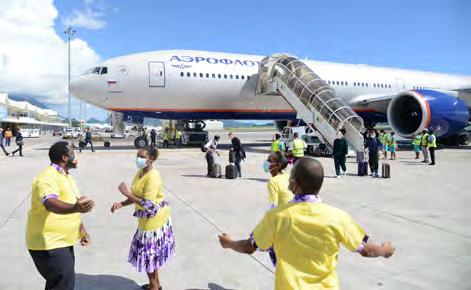
73 minute read
Personality Profile - Ms Caroline Abel
• Ms Caroline Abel
Up-close with MS CAROLINE ABEL
Advertisement
Governor, Central Bank of Seychelles
For nearly a decade, Ms Caroline Abel, has served as Governor of Central Bank of Seychelles, excelling in a field which is highly dominated by males. Even much more impressive is how she has been able to make the central bank relevant in these difficult times of Covid-19 pandemic which has hit hard at Seychelles with its tourism-dependent economy. In this exclusive conversation, Ms. Caroline opens up on what has accounted for her successes and the role the central bank is playing towards recovery.
Can you tell us briefly about yourself and your family?
I live on the main island of Mahé, in my home district since birth where I grew up in a close-knit family with my parents and younger sister. I would describe myself as compassionate, have a passion for helping others and attach great importance to hard work and education. These are all values I try to pass on to other people I come across in all walks of life.
Despite my responsibilities at the helm of the institution that has the crucial role of ensuring economic and financial stability, I also enjoy other things, such as going to church and reading, which the latter I firmly believe is important to keep abreast of the latest development. I also value my family, which I would describe as my pillar of support in all circumstances, and I try to spend as much time with them as possible.
What does it mean for you to be the first Seychellois woman to occupy this position?
The question does not fail to come up in every interview and it always presents an opportunity to highlight my firm belief that being a man or a woman makes no difference, as long as you are prepared to discharge your duties with zeal and confidence.
Since becoming Governor in March 2012, I have always focused on the role itself.
I have worked across all the different divisions and units of the Bank, which means I have received the technical training and exposure necessary to gain a holistic understanding of Central Banking. Over the years, I have also worked very closely with former governors of the Bank, which has inspired me to develop my full potential and allowed me to settle into the role of Governor.
As with every position of responsibility, particularly at the helm of an institution, you become acutely aware that you are now responsible and accountable for every decision, which can be an overwhelming thought at first. However, with time you learn to navigate and better manage the challenges and pressure of the role. It has been an enriching experience as well as a learning curve. Most importantly, it has been and continues to be a pleasure to work with a supportive and dedicated team to collectively address any emerging challenges, take decisions and move forward to attain the objectives of this very important institution.
Tell us about your career path within the bank up to when you were appointed as Governor. How has it been like?
My Central Banking career stems from my passion for Mathematics, which I studied along with Economics and Geography at Advanced Level at the Seychelles Polytechnic’s School of Humanities and Sciences. Adamant on gaining some work experience before undertaking further studies, I took up a junior position at the Social Security Fund in December 1993, although I had qualified for a government scholarship to pursue university studies abroad. My abilities did not go unnoticed, which led to my transfer to the Central Bank of Seychelles (CBS) in March 1994. I was formally appointed as Senior Bank Clerk in September 1994 after a six-month probationary period. I eventually proceeded for university studies, graduating with a BA in Economics, with Distinction from the University of Leeds in 1999. I then returned to the Central Bank to work as a Research Officer in the Research and Statistics Division, progressing to become a Senior Research Officer in the same Division in 2001 and subsequently, Director of Research in 2002.
In 2004, I decided to pursue a Masters in Philosophy (MPhil) in Monetary Economics and Finance at the University of Glasgow, graduating with Distinction in 2005. Back to work in the Research and Statistics Division after my studies, a year later, I was promoted to Head of Research and Statistics, a post I held until I was appointed Deputy Governor in July 2010. I was appointed First Deputy Governor in December 2011, following amendments to the Central Bank of Seychelles Act. My appointment as Governor came three months later, in March 2012, essentially becoming the first woman in Seychelles to hold the position. I was re-appointed to serve a second six-year term in March 2018.
How have you managed the perceptions and stereotypes in a financial sector which is largely male dominated?
While Central Banking has been traditionally maledominated, things have evolved in recent years. Today, we have women who used to take up more nurturing roles, choosing challenging career paths and brushing shoulders with male colleagues, including in the financial sector. As previously mentioned, I firmly believe that being a man or a woman should not make a difference in the workplace as long as the individual is prepared to work hard and deliver his or her duties with utmost confidence.
This stance is perfectly portrayed at the Central Bank of Seychelles, where in fact, the majority of our current workforce is mostly women and where inclusivity is greatly valued and there is much emphasis on initiatives that provide the entire workforce with the encouragement and opportunity to reach their full potential and advance in their careers, regardless of their gender.
As a small island with an economy largely dependent on tourism and having gone through a very stringent and economic reform only a few years back, what has been some of the challenges in balancing the country’s reserve and the Seychelles tourism books in the wake of Covid-19?
Given its heavy reliance on imports, having an adequate level of international reserves is critical for Seychelles. With the country’s main source of foreign exchange being tourism, and given that the tourism and travel trade was amongst the first economic sectors to be directly impacted by COVID-19, domestically, this translated into a significant reduction in foreign exchange inflows, which therefore also implies increased stress on the country’s reserves. Considering the floating exchange rate regime in place, there were some adjustments in prices to reflect the new condition in the market and in the process, demand fell. However, the resulted reduction in demand was less than the decline in foreign exchange inflows (supply). To support the market, the Central Bank sold reserves to commercial banks through an auction process in addition to direct sales to two key government-owned importers to ensure the availability of essential goods, including fuel. Moreover, the country continued to meet all of its external payment obligations. Amidst such environment, the management of the international reserves is being done with much emphasis being placed on ensuring that it can cover the country’s payment obligations over the longest possible timeframe. To note, the return on the portfolio of reserves invested had reduced significantly in view of the low interest rate environment due to the accommodative monetary policy stance of most major Central Banks.
How supportive has the Central Bank been in financing or driving investments into Seychelles Tourism?
On a final note, it is equally important to have values and principles that should remain the standard that we live by, and personally, the motto which I always apply in all my undertakings and which I would like to be remembered for is to always say the truth, irrespective of who it might offend. This is what we call integrity. "
As from the second quarter of 2020, the Central Bank lowered its policy rate by 100 basis points for the second quarter and a further 100 basis points for the third quarter to support domestic economic activity and reduce financial stability risks. The Monetary Policy Rate (MPR) was maintained at 3.0% for the remainder of 2020 and was kept at that level for the first and now for the second quarter of 2021. To support critical operating expenditures of businesses impacted by COVID-19, the Board of the Central Bank also approved two credit line facilities under a Private Sector Relief Scheme being administered by various creditgranting institutions. The first amounting to SCR500 million is being made available to Micro, Small and Medium Enterprises (MSMEs), while the second facility is for a total sum of R750 million to provide support to larger businesses.
Any words of encouragement for young people especially women who are looking up to you and wish to be like you? What legacy would you like to be remembered with?
My advice to the youth is to seize every given opportunity, particularly to study, as education is key. In addition, one should never be afraid to follow his or her dreams when choosing a career and should be prepared to work hard and give their very best. For women specifically, building a career may sometimes be more challenging given they also have to balance the responsibility of taking care of their families - including bearing and raising children. In spite of this, from my experience leading a workforce where the number of women stands at 65 per cent, I have seen their determination and tenacity as they go through life’s experiences while also excelling in their studies and careers. These attributes are very important not only for women but for every individual to have. Life may not always be easy, and there will be hardships and challenges along the way, but these tests and trials should be seen as opportunities to grow and develop one’s potential. On a final note, it is equally important to have values and principles that should remain the standard that we live by, and personally, the motto which I always apply in all my undertakings and which I would like to be remembered for is to always say the truth, irrespective of who it might offend. This is what we call integrity.
HOW VISITOR ATTRACTIONS CAN RESPOND TO GUESTS’ NEEDS DURING COVID-19
Visitors to attractions are leaving home to have a real life experience, one that they can share with others, both on site and on social media.
The primary reason for visitors to leave home (whether domestic or international) for a day out of one’s own four walls; an experience that delights all our senses and connects us with others – something that no virtual experience can produce no matter how fancy the offering. If visitors are focussing on the experience offering more than ever – what can you do to improve your experience? Simple interventions can make a big difference. 1) Support the fun don’t spoil the fun The wearing of masks, sanitising and social distancing has become the norm and will be here to stay for the foreseeable future. This will be the new way of operating for the near to medium term, they should be part of standard operations. Invest in time and energy to understand how they can be achieved with minimal impact on the experience; perhaps even adding a fun element. Be creative. 2) Contactless transactions Contactless transactions are also here to stay. Ensure your experience is physically distanced but not socially distanced. Save the (physically distanced) contact with guests for the parts of your experience that truly add value. You will find that guests want to avoid cash and will have greater use of credit cards and other contact-less payments. Make sure you are ready. 3) Create fun Guests have elected to leave their safe, Covid-free, homes for a less safe space (your attraction) because they want to have fun and socialise. The USA Toy Association released their top toy trends for the year in February 2021 and these trends speak to new ways of being more than just new ways of buying. What can visitor attractions learn from trends in toys? a) Rediscovering play – in these serious and scary times we want to play more. Play to stay connected, play to supplement the learning that we are missing from school and conferences and play just to rediscover fun! b) Not just for Kids – adults want to play too. The Toy
Association has seen a massive increase in sales for games and toys for adults. c) Mix in the Music – Tiktok is the social media tool used by young adults – are you using this tool in your marketing mix?
d) Zen-sational Toys” – Toys, and a day out, can give us emotional support, enhance our wellbeing and help us navigate the stress of the world around us. How can your site help create moments of zen; relaxation and mindful ness?
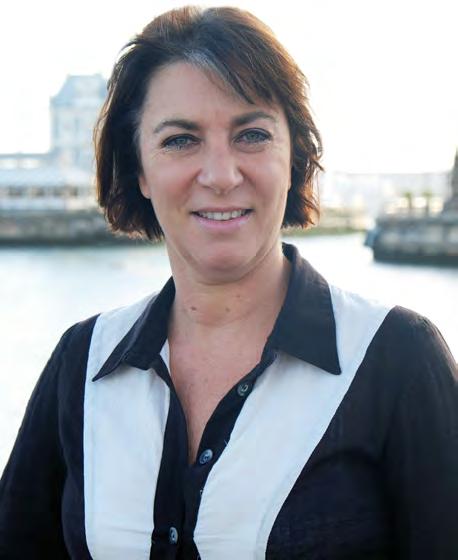
4) Increase dwell time on site. The costliest and most difficult part of your marketing is to translate the call to action to actual action to visit your attraction. Once they are on site you need to maximise their time on site. Dwell time on site leads to increased spend and increased perception of value for money and value for time. Your guests have invested time and money before they are even through the entrance gate. This upfront investment needs to be worth their while, and one way is to increase dwell time.
The African Association of Visitor Experience and Attractions’ (AAVEA) mission is to represent the interests of visitor experiences and attractions, to raise awareness of the contribution they make to the broader tourism industry, to enhance discussion and co-ordination among visitor experience and attraction professionals, and to host an annual conference that provides education, valuable engagement with industry peers, and collaboration opportunities. WWW.AAVEA.ORG.ZA Sabine Lehmann Twitter: @CityBowlKid www.curiositas.co.za
Sabine Lehmann has first-hand insight into the challenges and opportunities facing the attractions industry – especially on the African continent. Having held leadership roles in some of South Africa’s most iconic tourist attractions Sabine understands from the inside out how difficult it is to run a profitable and sustainable attraction in a world that is constantly changing. Sabine is committed to building African attractions and is the founder and Chair of the African Association of Visitor Experiences and Attractions (AAVEA) and a government relations committee member of the IAPPA (The Global Association for the Attractions Industry). She holds an MBA from University of Cape Town and an MPhil (Futures) from the Stellenbosch University.
• Sabine Lehmann
Exploring tourism’s best kept secret in Rwanda: THE LAND OF A THOUSAND HILLS
Rwanda is a modern nation with a fast- growing economy. It is ranked the third most competitive country in Africa by the World Economic Forum 2016 Competitiveness Report, and is rated one of the cleanest and safest countries in Africa. Kigali is within easy reach of our rich offering of cultural and natural treasures. Take advantage of a range of experiences in discovering Rwanda – venture into our national parks to track the endangered mountain gorilla on the slopes of the Virunga Volcanoes, enjoy a ‘Big 5’ safari in Akagera, rated amongst the most scenic national parks in Africa, or learn about the rich biodiversity in Nyungwe, the largest protected mountain rainforest in Africa. The Cultural Heritage Corridor, community tours, tea and coffee plantations, adventure experiences and the shores of Lake Kivu await you. The country’s delicious local cuisine, unique culture and arts, combined with breathtaking natural beauty are waiting for you to come and experience a taste of Rwanda’s warm hospitality and wonderful people. You will quickly learn what makes Rwanda remarkable, and why we are becoming one of Africa’s most popular tourist destinations.



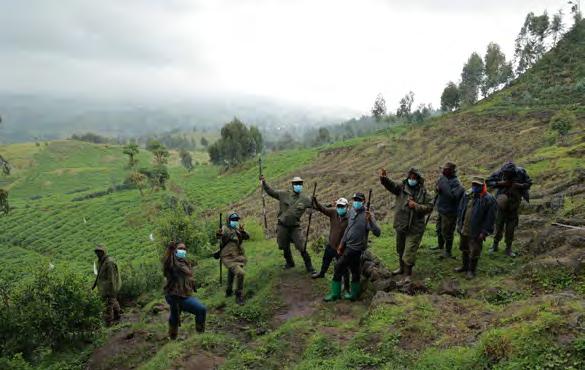
• Skulls displayed at the genocide museum in Kigali

Rwanda lies just south of the Equator, in the heart of Africa. In the space of a week, it’s possible to experience an extraordinary range of wildlife and landscapes thanks to the country’s relatively small size and biodiversity. Known as the land of a thousand hills, Rwanda’s stunning scenery and warm, friendly people offer unique experiences in one of the most remarkable countries in the world. It is blessed with extraordinary biodiversity, with incredible wildlife living throughout its volcanoes, montane rainforest and sweeping plains.
• Trekkers and porters pose for a picture after conquering the volcanoes national park
Kigali Genocide Memorial
The people of Rwanda embrace peace and reconciliation.
They are committed to fight the ideology of genocide. The memorials found throughout the country are moving testimonies in memory of the 1994 genocide against the Tutsi and the people who lost their lives. Inaugurated on the 10th anniversary of the Rwandan genocide, the Kigali Genocide Memorial at Gisozi is where 250,000 victims have been buried.
The wall of names is dedicated to those who died and is work still in progress. Many of the victims’ names have yet to be gathered and documented and many of the victims who rest in the graves are unknown. The memorial gardens provide a place for quiet contemplation about the history of the Genocide against the Tutsi. They allow visitors to reflect on how we all have a personal responsibility to prevent discrimination and mass atrocity. The centre also provides support for survivors, in particular orphans and widows.
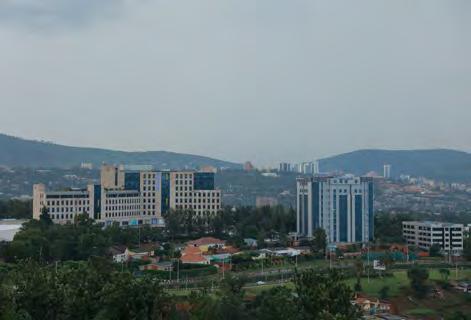
• An aerial view of the city of Kigali
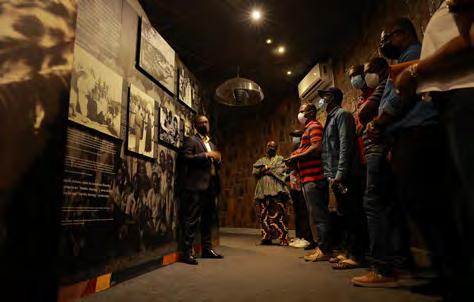
Gorilla Tracking
The unique opportunity to see gorillas in their natural habitat is unforgettable, some even say life changing. Encounters with gorillas as they go about their daily lives are carefully managed, with expert trackers and guides leading small groups of tourists up bamboo-covered slopes to spend a precious and aweinspiring hour just a few feet away from the gentle creatures. The largest living primate, gorillas are spread across much of the equatorial African rainforest. Broadly speaking, the species is split into lowland gorillas and mountain gorillas. The volcanic range which spans Rwanda, Uganda and the Democratic Republic of the Congo is home to the endangered mountain gorilla. Tracking gorillas in Rwanda is safe and relatively accessible. Out of approximately 1,000 mountain gorillas in the wild, 604 can be found in the Virunga Massif. There are twelve gorilla families living in the Volcanoes National Park, which are fully habituated, with a few others habituated solely for scientific research. The groups, or troops, consist of at least one silverback along with several females and youngsters.
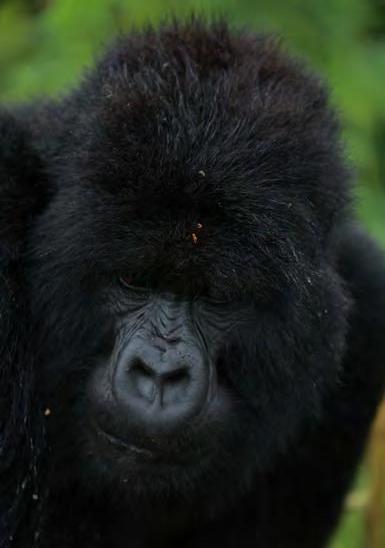
• Visitors at the Genocide Museum

Volcanoes National Park
Situated in the far northwest of Rwanda, Volcanoes National Park protects the steep slopes of this magnificent mountain range – home of the endangered mountain gorilla and a rich mosaic of montane ecosystems, which embrace evergreen and bamboo forest, open grassland, swamp and heath. Volcanoes National Park is named after the chain of dormant volcanoes making up the Virunga Massif: Karisimbi – the highest at 4,507m, Bisoke with its verdant crater lake, Sabinyo, Gahinga and Muhabura.
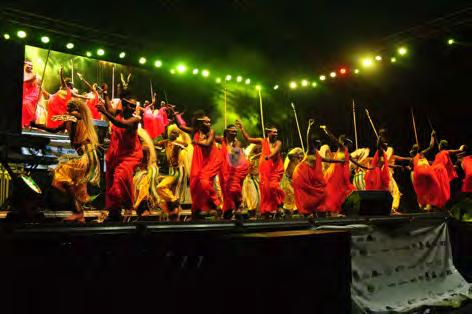
Akagera National Park
The relatively warm and low-lying plains of Akagera comprise savannah, woodland, wetland and a dozen lakes. In partnership with African Parks, we have reintroduced lions and rhinos, meaning once again visitors can hope to see the Big Five on safari drives.
Lake Kivu
Part of Africa’s Great Rift Valley, Lake Kivu is dotted with islands and inlets along its shoreline, with charming beach resorts, spectacular vistas and plenty of opportunities for hiking and cycling.
Festivals and Events
Kigali
Ideally positioned in the centre of Rwanda, Kigali extends across several hills and valleys, with good road links to the rest of the country. The verdant capital city is pleasantly low key yet dynamic and progressive, with just over one million inhabitants.
First-time visitors to the bustling and colourful centre often remark how clean the streets are, a matter of pride across every community throughout the country.
• Performers at an event in Kigali
A celebration of Rwandan creativity and nature. Among events held each year includes the Kwita Izina Gorilla Naming Ceremony held at the Volcanoes National Park where new baby gorillas are named for purpose of conservation, the Kigali Up festival which brings together music from across the world to Kigali, and the Rwanda Film Festival that showcases films from Rwanda, Africa and Across the world.
Rwanda invites you to the land of a thousand hills and a million smiles.
• View of the Volcanoes National Park

Namibia Wildlife Resorts
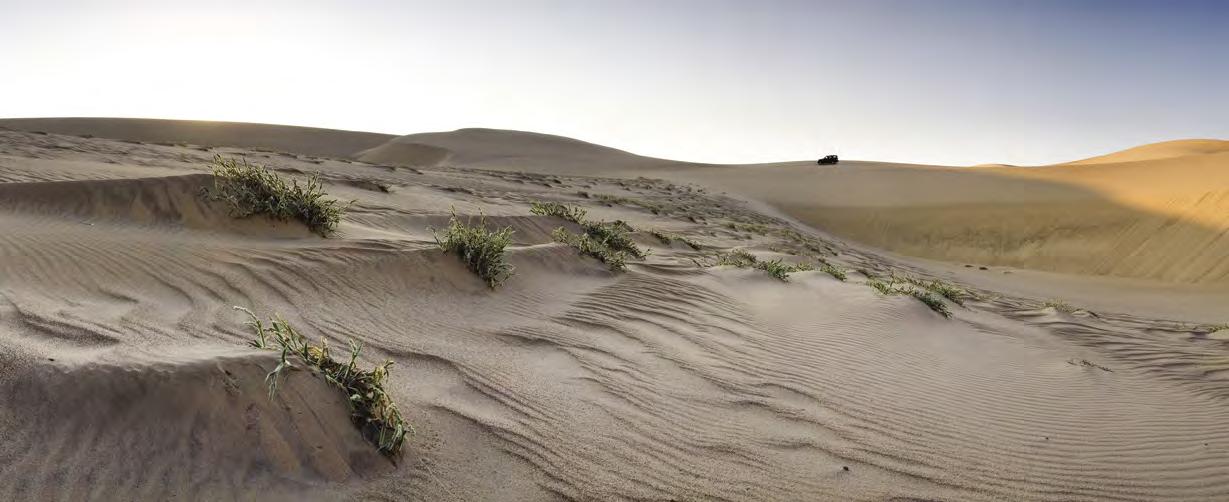
Still conserving Namibia’s natural heritage!
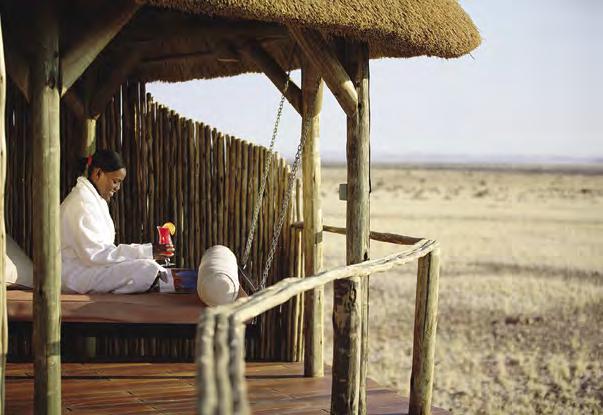

Namibia Wildlife Resorts has become part and parcel of the Namibian experience, even for those as far afield as America or China. As a state-owned enterprise, we manage resorts and camps in Namibia’s vast and diverse protected areas – the only hospitality provider that can do so. This provides you with a chance to explore and relax at your own pace.
With more than 20 different destinations across Namibia, we have a smorgasbord of experiences for you, so whether you are a traveller that demands luxury at your fingertips or you are looking for an adventure, we have a spot where you can get your groove back.
From the world-renowned Etosha National Park where, by the way, you can enjoy camping to five-star luxury, all the way through to the magnificent horizons of the south, the humid forest-lined banks of the Okavango, or even a castle… we show you Namibia as she is. Beautiful, natural, harsh, and unspoiled.
Your holiday, breakaway or business trip will also contribute to community development and the sustainable use of Namibia’s natural resources. With your exclusive NamLeisure card, you are not only assured of great discounts for your Namibian adventure, but you also know that you are contributing to the Enviro-Kidz programme.
Whether you need a weekend or month away, or your team needs building, or, you have something to celebrate, Namibia Wildlife Resorts is your partner to discover Namibia and make memories to last a lifetime!
Log on to nwr.com.na and unlock your Namibian adventure… you have no idea what’s waiting for you
BOOK ONLINE OR CONTACT US!
+264 61 285 7200 reservations@nwr.com.na www.nwr.com.na
The African Union Development Agency-New Partnership for Africa’s Development (AUDA-NEPAD) is continuing in its mandate to coordinate and execute priority regional and continental projects to promote regional integration towards an accelerated realization of Agenda 2063 and to strengthen capacity of African Union Member States and regional bodies. This is according to the Agency’s Director of Programme Implementation, Planning and Innovation, Mrs. Estherine Fotobong who in an interview with VoyageAfriq, gave an insight on her outfit’s Post Covid-19 African Tourism Recovery Strategy launched in the midst of the pandemic to support member states. She said the pandemic has posed significant threats to their operations, disrupting their programme of activities. For her however, Covid-19 season can be looked through a positive lens as the pandemic has presented to the world an opportunity to rethink the innovation of development. She further explained that the pandemic has caused the reaffirmation of the significance in building socio-economic resilience post Covid-19 as it has also demonstrated the challenges Africa is facing in terms of economic inequality. Mrs. Fotabong said that an analysis of the impact of the pandemic by AUDA-NEPAD highlighted issues relating to tourism and security and developed early warning systems and mechanisms to deal with other unforeseen crisis and future pandemics. The objectives of the post Covid-19 African Tourism recovery strategy initiative include, creation of a reference system that presents good practices and response that look at what pertains to other regions, and what they have done as a tool to assist member states in their response and recovery processes to anticipate futuristic threats and risks.

Others comprise, coordinating the efforts of member states and partners to ensure minimized duplication to promote evidence-based public health practices in the tourism sector and to address key areas involving diversification of
• Mrs. Estherine Fotobong, AUDA NEPAD Director markets, products and services. It also highlights the issue of investment in the various markets, intelligence systems and digital transformation of the sector. Mrs. Fotabong stated that the Agency will maintain its strong relationship and partnership with United Nations World Tourism Organisation to advance recovery in the area and tourism and travel for Africa,
According to her, it is time for Africa to channel their focus on innovation in building a sustained and resilient tourism. “We need the right kinds of investment, and we need to look at ways of building resilience and enhancing sustainability in the sector’, she said.
In addition, Mrs. Fotabong emphasised that it is imperative to prioritise digitization, especially among Member States that are unable to access connectivity, to promote digital marketing; online advertisement, online shopping and other related digital fields.
64th Commission for Africa Meeting heads for Cabo Verde
The Republic of Cabo Verde is scheduled to host the 64th UNWTO Commission for Africa (CAF) Meeting . The meeting is slated for 2-3rd September in Sal Island. . The Commission meeting will be followed by the 2nd Edition of the UNWTO Global Tourism Investment Forum in Africa.
The Commission of Africa Meetings are held every year as part of UNWTO’s statutory events. The UNWTO Regional Commission for Africa is the major institutional platform where ministries in charge of tourism discuss the latest trends of the sector at the continental and global level and the implementation of their program of work.
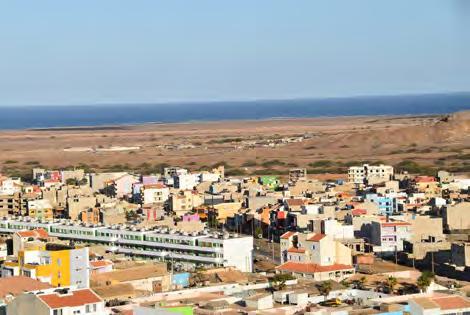
Limpopo Tourism Agency announces Ndavhe Ramakuela as Acting CEO
The Limpopo Tourism Agency (LTA) Board of Directors has announced changes to its executive management with Mr. Ndavhe Ramakuela as Acting CEO. This is follows the end of term of Mr. Sello Maleka, who acted as CEO of the Provincial Tourism Authority for the last five months At a presser to announce the changes, LTA Board Chairperson Mr. Andrew Dipela, thanked Mr. Sello Maleka for steering the ship for the past five months. He will now move to his position as Chief Corporate Services Officer to lead a new and exciting program which requires his full attention. Pronouncements about this project will be made in due course when the Agency outlines its plans for the 2021/22 Financial Year. “It would have been our intention to appoint a new and permanent CEO by now, however, there is a process of reconfiguration of State-Owned Entities in the Province led by the Office of the Premier. As a responsible entity, we would like to respect that process and await its completion before making any senior appointments,” he disclosed Mr. Ndavhe Ramakuela, the Acting CEO, expressed his gratitude to the Board for the opportunity and was confident that the entity would do well as it had already seen better results since tourism re-opened after a hard lockdown last year. “The international travel might still be closed as entire Europe and the Americas are experiencing a resurgence of Covid-19 in the form of a third wave, but this gives us an opportunity to focus on domestic tourism. Since Tourism Month last year, the entity has been working hard to implement the recovery plan. We also conducted a successful Summer Campaign, which was also supported by South African Tourism (SAT) to promote destination Limpopo. Just recently we conducted a successful brand awareness campaign called #UnlikeAnyOther, which sought to make Limpopo top-of-mind destination to travellers all over the world. We are positive that with the budget we received, we will still continue to market Limpopo with more vigour and enthusiasm to make it a must-visit destination in the country”, said Ramakuela. The new appointments are as follows: 1. Mr. Ndavhe Ramakuela the Chief Marketing Officer of the entity was announced as the new Acting Chief Executive
Officer for a term of six months.
2. Mr. Peter Maila, Financial Management Senior Manager’s term as Acting Chief Financial Officer has been extended with an additional six months.

3. Dr Mavhungu Musitha, Senior Manager Information
Services, has been appointed as the Acting Chief
Marketing Officer (CMO) for a term of six months.
• Mr. Ndavhe Ramakuela, Acting CEO, Limpopo Tourism Agency
Seychelles Travel Update
Seychelles has reached a significant milestone in its national immunization campaign by becoming the world’s first country to achieve herd immunity through vaccination. With more than 70 percent of the island nation’s adult population now fully vaccinated against COVID-19, Seychelles has expanded its borders to welcome visitors from anywhere in the world regardless of their personal vaccination status. As of March 25, visitors only required to present a negative PCR test taken within 72 hours of departure to Seychelles and there will no longer be a quarantine requirement nor any restriction on movement upon entry to the destination. Additionally, the minimum stay in establishments upon arrival will no longer be applicable. In light of reopening the country’s borders to visitors by air, Seychelles has also re-examined its cruise ship season, which was temporarily shut-down last March in effort to protect the population from the threat of COVID-19. Beginning this August, Seychelles expects to welcome cruises again with a maximum capacity of 300 passengers allowed. For the latest news and guidance on travel to Seychelles, please visit: https://advisory.seychelles.travel/.

Strong Interventions Pillar of Recovery and Sustainability Plans – Morocco’s Tourism Minister
Morocco, like many other countries around the world, has not been spared from the crippling effect of the Coronavirus pandemic on hospitality and tourism. But right from the onset, the country introduced comprehensive and robust austerity interventions to support businesses and professionals in the sector.
This was revealed by Nadia Fettah Alaoui, Morocco’s Minister of Tourism, Handicrafts, Air Transport, and Social Economy in an interview with VoyagesAfriq. “As you know, tourism is about people and mainly, very skilled people and expertise, so we made a huge effort to support corporates and businesses to keep as many jobs as possible. So the government has provided direct subsidies to the companies, to the employees and the deal with the corporates is to at least keep 80% of the jobs." "It started at a very early stage, last year in March. Then we had a specific contract with the professionals in tourism that was launched in July until December and because of the second wave of the pandemic, we extended until coming 2021,” she said. The North African country also launched safety guidelines for its hospitality sector which have been adopted and received high-level compliance from industry players. She said “we need people and businesses to be safe, it was our first priority and under the guidance of His Majesty the King. So a big effort was made by the government and professionals to comply with all the guidelines regarding the safety of both employees and clients. So our first effort was to have a guideline for hospitality which was introduced in April. It has also been fully complied with by the hospitality industry. This allowed us to restart internal and local tourism last summer.”
This the Minister added is important to be able to restart tourism with the right people and in the right sanitary conditions. Beyond this, the Minister averred that Morocco has also made crucial moves to ensure that it is recognized globally as a safe destination for travellers. “To prepare for a proper restart, we have launched with Veritas, the international cooperative for security another brand name, “Welcome Safely.” So it is a much more comprehensive guideline for safety within hotels and the hospitality industry and we are offering training and knowhow expertise to all professionals in Morocco. Our objective is to have a majority of hotels and hospitality establishments to have this label and to be able to communicate why they have this label for Morocco,” Alaoui stated.
She also disclosed that “we are making a huge effort around marketing and promoting the Moroccan brand and its regions so that we are well-positioned because we know that there will be strong competition when we restart tourism around the world but we think that we have a lot of abilities and capabilities so we are preparing plans and materials to be presented in major markets in the future.”
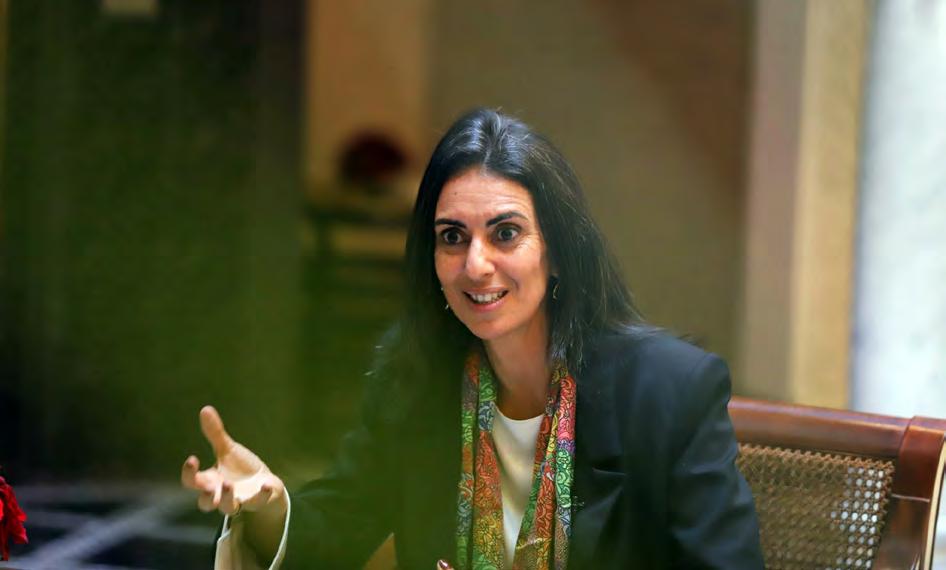
Cabo Verde aims at building a diverse and resilient Tourism Sector – Director General
The Director-General of Tourism and Transport in Cabo Verde Francisco Martins has revealed that the Cabo Verde Government is preparing the country for more diverse, resilient, quality-based tourism with an ultimate aim of improving conditions of life of Cabo Verdeans. Francisco Martins, representing the Minister of Tourism and Transport, Carlos Santos, said this at the launch of the formative activities of ′′Response to the Covid-19 crisis and recovery of the Tourism sector in Cabo Verde′′ under the programme, Competitiveness Support in West Africain Cape Verde. The project is funded by the European Union at a cost of 4.930.000 Euros and implemented by the UNDP and the Government of Cabo Verde through the Ministry of Tourism and Transport. The project adapted to provide the recovery of the tourism sector in Cabo Verde in the face of Coronavirus crisis takes account of the training of more than a thousand professionals linked to the Tourism sector, including tour guides, travel agency agents, taxi drivers, border police officers, airport staff and municipal guards and middle heads of small and medium-sized hotel units. It is also aimed at empowering key actors and increasing competitiveness of Medium, Small and Micro Enterprises through quality certification and supply chain integration. With the advent of the pandemic, the government has launched support for businesses, jobs, and families that are most vulnerable.
According to the Director-General of Tourism and Transportation, the pandemic has affected Cape Verde, whose economy has 25 % of tourism-based GDP. He stated, "the pandemic, never before experienced by our generation, was in our country and in our homes.” Francisco Martins added that there was no time to waste, “so we needed to act fast, in the face of this one ‘harsh reality‘, the Government’s response was not kept waiting, and took all necessary steps and launched support for businesses, jobs and vulnerable families.” According to Francisco Martins, the Tourism Renaissance Plan of the Ministry of Tourism and Transport takes into account the valuation and training of more than two thousand five hundred professionals linked to the tourism sector covering all the areas of the country.. The Director-General further stressed that national companies in the sector, in particular travel and tourism agencies, tour operators, tourist entertaining companies, will be targeted by specific empowerment and resource enhancement programmes with more initiatives by the Ministry of Tourism and Transport. This is also aimed at making businesses from different sub-sectors downstream and upstream in tourism to take advantage of the new business opportunities that have emerged as a result of this crisis.
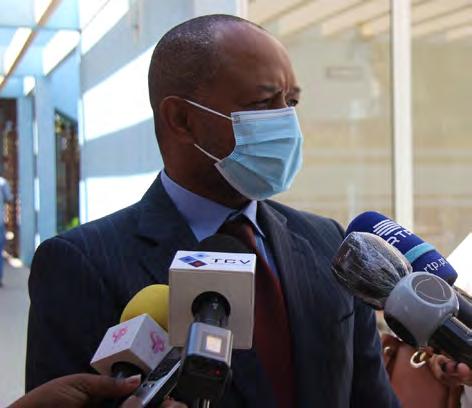
Francisco Martins took the opportunity to announce and reaffirm that the Government, through the Ministry of Tourism and Transport, in partnership with EHTCV, the IEFP, the Pro-Company, the Directorate-General for Employment, Vocational Training and Professional Internships, among others, will be launching the emergency empowerment and self-employment programme for tourism employees in the next few days. It will cover about 5000 beneficiaries across the islands, with the aim of mitigating the negative effects generated by covid-19. Above all, supporting young people and their families and more inclusively resuming their activities and job creation linked to the tourism sector, subsectors and beyond.
• Francisco Martins, Director General - Cabo Verde Tourism Sector
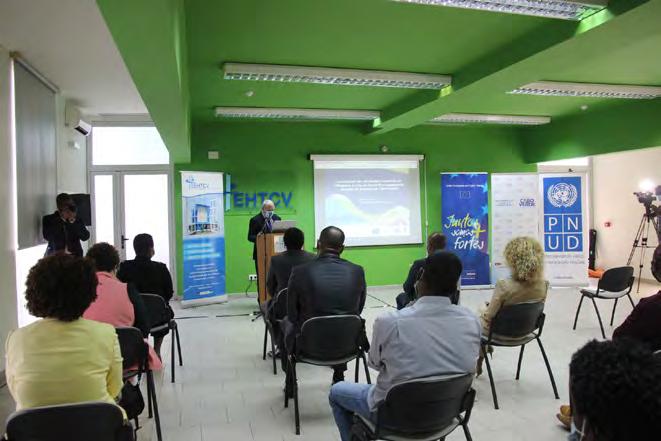

Ghana to collaborate with Rwanda to Promote Ghana to collaborate with Rwanda to Promote Intra-Africa Travel

A 30-member Ghanaian trade and tourism delegation have concluded a 7-day trade mission to Rwanda. The mission which was facilitated by the Rwandan High Commission in Accra with the support of the Rwanda Development Board was to help the team to explore the trade, tourism and investments opportunities in both countries. The discussions centered on collaboration, information sharing and Investments. The team was composed of personnel from the Ghana Tourism Authority, Ghana Exports Promotion Council, Ghana Tourism Federation and selected members of the Ghanaian Media as well as leading tour and travel operators. The team was welcomed in Kigali by Ghana’s Honorary Consul in Rwanda Denis Karera, the Rwanda Development Board.
During the weeklong trip, the delegation toured various touristic and business areas in Rwanda and had meetings with a wide range of Rwandan leaders from the private and public sectors including a business-to-business networking session for tourism and hospitality. Belise Kariza, Chief Tourism Officer at the Rwanda Development Board said “COVID-19 has taught us that Intra-Africa travel is key to sustaining tourism” expressing Rwanda’s keenness on building the linkage with the private sector to grow the numbers for both countries. On his part, Director for Product Development and Investment at the Ghana Tourism Authority Benjamin Anane-Nsiah emphasized the need for such partnerships and indicated that “Ghana is open to working with their Rwandan counterparts to develop a framework to facilitate this partnership and achieve the expected results”. Her Excellency Dr. Aisa Kirabo Kacyira, Rwanda’s High Commissioner to Ghana emphasized the bigger picture of the trip saying that it is was more than just a touristic visit. “It is about creating and advancing relationships and partnerships needed to bolster intra-Africa tourism and trade”.
The Ghanaian Contingent also had the opportunity of visiting the Volcanoes and Akagera national parks, site inspections of hospitality facilities and rounded up the visit with a luncheon with senior officials of the host agencies led by the Permanent Secretary of Rwanda’s Ministry of Trade and Industry Mr. Michel Binega Sebera. Having completed the tour of Rwanda, the Ghanaian team have committed to working with the High Commission and their Rwandan counterparts to facilitate a similar visit by the Rwandans to Ghana in the near future, to further bolster mutual interest and partnership towards increased tourism and business exchanges.
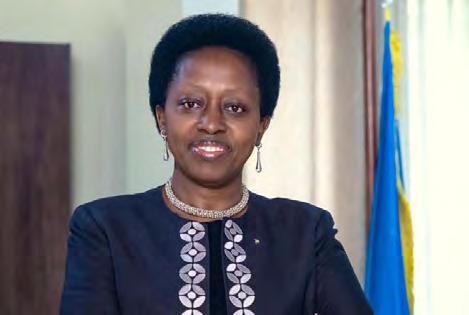
Ghana’s Visit to Rwanda in Pictures
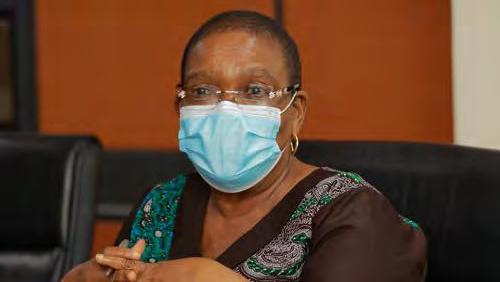
• Belise Kariza- Chief Tourism Officer at RDB addressing the delegation • Bella Ahu- President of the Ghana Tourism Federation
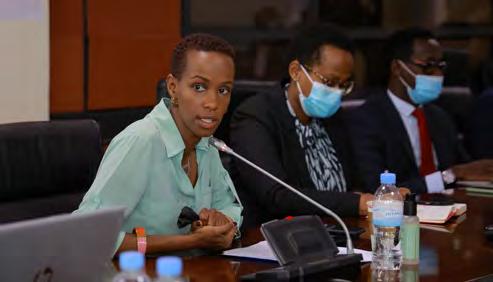
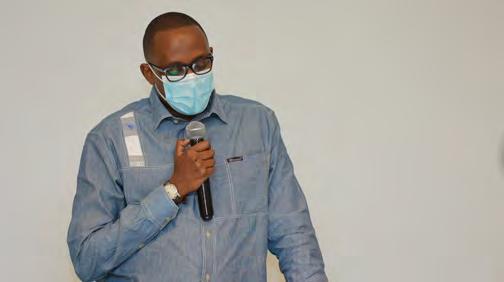
• Frank Gisha- Head of Rwanda Chamber of Tourism • Permanent Secretary at the Ministry of Trade and Labour – Michel Sebera
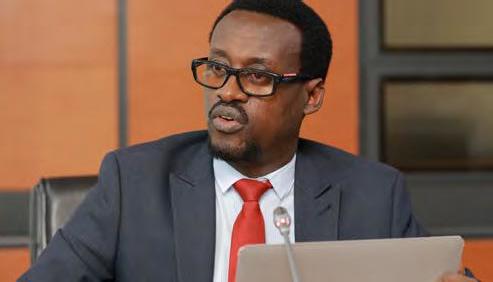
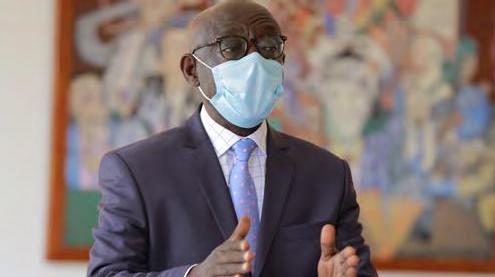
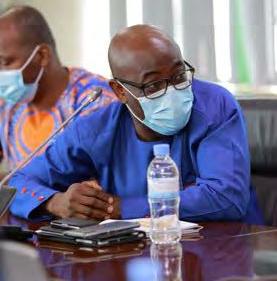
• Ghana’s Honorary Consular – Daniel Karera • Site Guide, Fidel at the
Volcanoes National Park • Ben Anane Nsiah- Director of Investments and Product
Developments, GTA
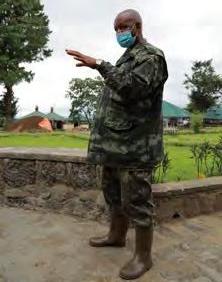

• Dr. Afua Asabea Asare , CEO of Ghana Export Promotion Authority (GEPA)

• The Ghanaian Team spent some time with the gorillas at Volcanoes National Park • Ariella Kageruka, Head of Conservation & Tourism -RDB and Bella Ahu of GHATOF in an elbow shake
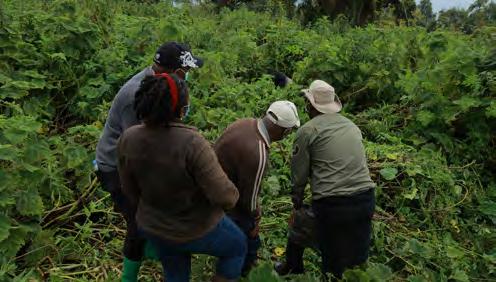
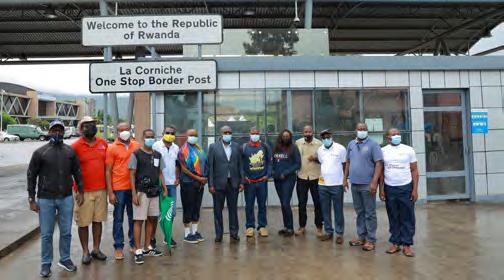
• The Ghanaian Delegation lay wreaths at the genocide museum
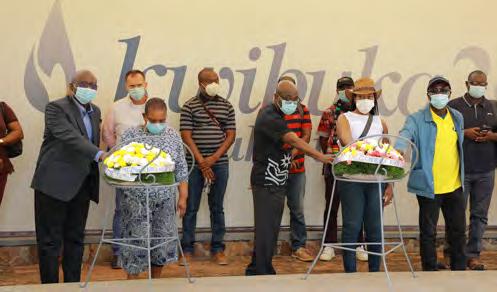

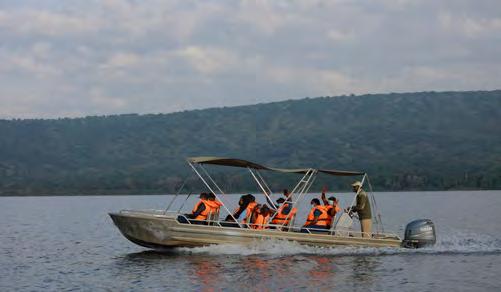
• A visit to a flowering company • Boat cruise for the visiting delegation at Akagera National Park
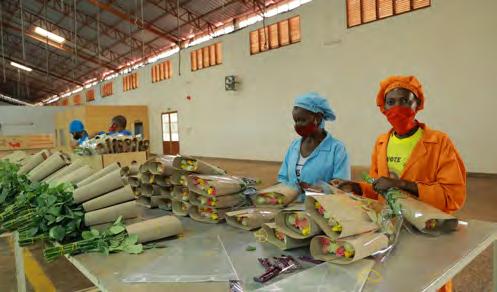

• The team on safari
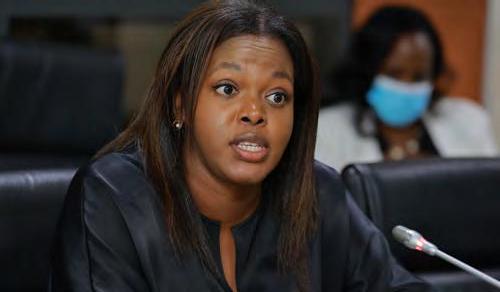
• Site visit of the team at Epic hotel and suites

• Members of the Ghanaian Delegation pose for a photo at the reception area of the Volcanoes National Park • Bonita Mutoni- Chairperson of Rwanda Tours and Travel Association
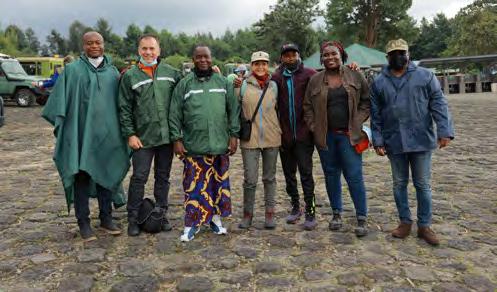
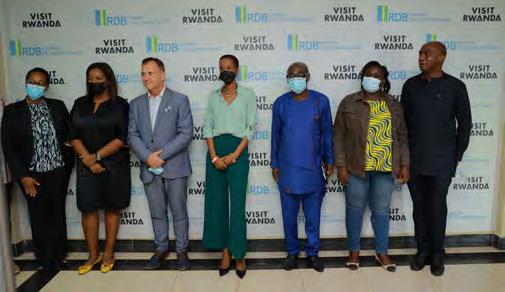
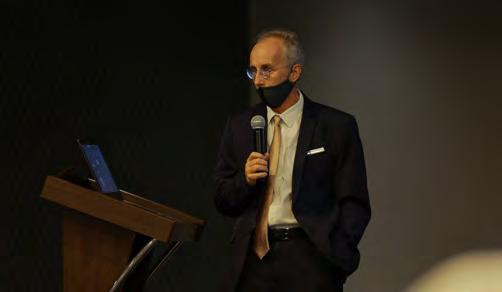
Ghana targets $5 billion tourism revenue by 2022
The newly appointed Minister of Tourism, Arts and Culture, Dr. Ibrahim Mohammed Awal has given the strongest indication of his readiness to make Ghana’s tourism profitable thus deepening its relevance to the economy in terms of revenue generation. To this end, Dr. Awal has expressed his desire to generate $5 billion from the tourism industry by December, 2022. He disclosed this at a two-day retreat for heads and management of agencies under the Ministry on 25-26 March, 2021 in Akosombo.
He observed that the tourism industry was not doing well as expected and indicated his resolve to turn the economic fortunes of the sector by creating massive employment opportunities for the Ghanaian citizenry. He intimated that on his assumption of office, President Akufo-Addo charged him to use his business acumen and entrepreneurial skills to change the face of Ghana’s tourism industry. In addition to this, the Minister said, he would also focus on a strategic policy direction to help the sector. He further expressed his commitment to make Ghana’s tourism sector number one contributor to the country’s GDP from its current third place ranking. Ghana’s tourism, until the advent of COVID-19 pandemic had been projected to rise significantly for both arrivals and receipts following the huge success of the “Year of Return” initiative. Figures from the 2019 Tourism Report by the Ghana Tourism Authority indicated that the country earned over $3,312 billion in tourism receipts. With a goal of ensuring one million domestic tourists each year, the Minister hopes to get the country’s tourism back on track while driving investments into the creative arts and culture sub-sectors.
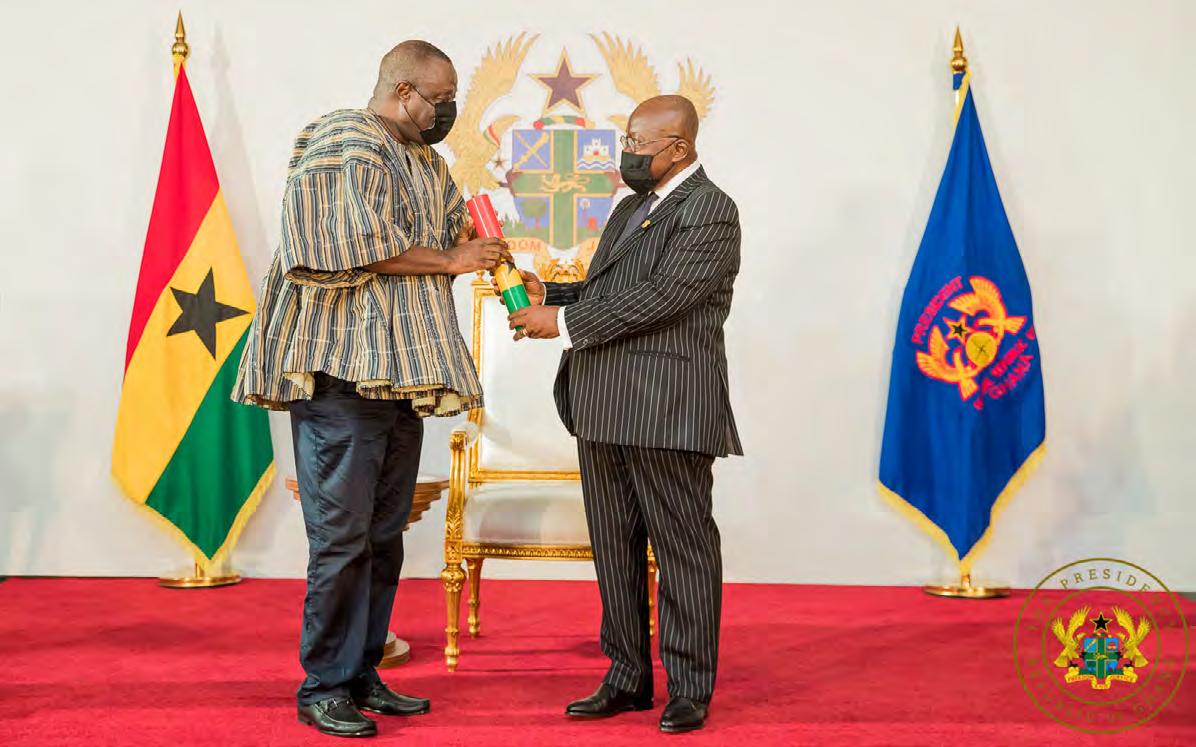
Dr. Awal urged the agencies to work together and in tandem with the Ministry to help realize the overarching goal of making Ghana, West Africa’s tourism hub.
• Tourism, Arts and Culture Minister,
Dr. Ibrahim Mohammed Awal (left) receiving his scroll of office from
Ghana’s President Akufo-Addo earlier this year to lead the sector
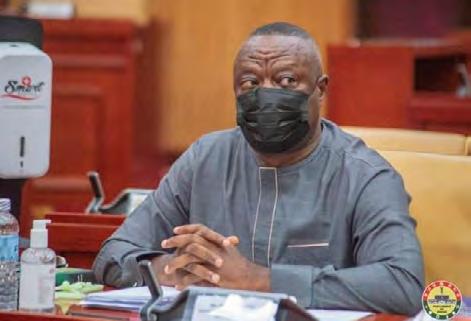
We’ll work with you to drive Domestic Tourism: Ghana’s Tourism Minister assures Tour Operators
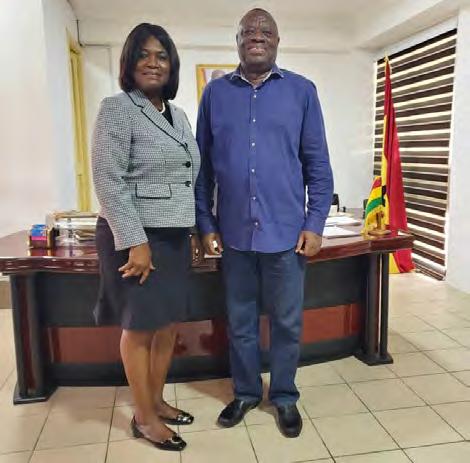
• Mrs. Alisa Osei Asamoah in a shot with Tourism Minister,
Dr. Ibrahim Mohammed Awal
The Minister of Tourism, Arts and Culture, Dr. Ibrahim Mohammed Awal has stated his readiness to work closely with the Tour Operators Union of Ghana (TOUGHA) to drive and promote the domestic tourism agenda of the country. Dr. Ibrahim Mohammed Awal gave the assurance when leadership and some members of TOUGHA paid a courtesy call on him on March 25th, 2021 to welcome him to his new office as the sector’s Minister. The visit was also to allow for TOUGHA to formally introduce themselves to the Minister as key stakeholders of the country’s tourism sector. Dr. Awal said that the Ministry will frequently engage stakeholders, especially the private sector to deliberate on ways to strengthen Ghana’s tourism as they seek to promote domestic tourism and make the country West Africa’s tourism hub.
“We will have quarterly meetings with the private sector and stakeholders including Tour Operators for us to dialogue. We want to make Ghana the tourism hub in West Africa. We are very stable, we have good governance and beautiful attractions that can help us to achieve that. And to make Ghana the tourism hub, we need TOUGHA because you tell people what it is that the country has." “As a government, we will give you the framework within which you can work to drive domestic tourism so that we can increase the numbers. We want to have at least a million local tourists each year to complement the international arrivals,” the Minister said. On her part, President of TOUGHA, Mrs. Alisa Osei Asamoah who led the delegation expressed hope that they would have fruitful partnership with the Minister and the Ministry as they work to grow Ghana’s tourism. Thanking the Minister for granting them audience, Mrs. Osei Asamoah also assured him of their full support in his new portfolio and wished him well.
“We are happy you are here and it is refreshing to hear your willingness to work with us. We are convinced that you will live up to what you’ve assured us of and we are also ready to work with you to move our tourism forward,” she said. The TOUGHA delegation compromised, Mrs. Alisa Osei Asamoah – President, Nana Okatakyie Anim- Chairman of the 5-year strategic planning and Mrs. Abe Blay Asmah- Chairperson of Domestic Tourism Promotion. The rest are Mrs. Yvonne Donkor- General Secretary, Mr. Kweku Passah- member, domestic tourism promotion, Ms. Sylvia Anim and Mr. Emmanuel Boateng both of fundraising and events of TOUGHA.
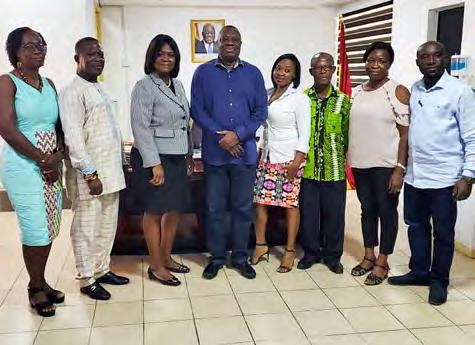
• TOUGHA Executives with the Minister
Botswana Tourism Organization bids farewell to CEO
The founding CEO of the Botswana Tourism Organisation (BTO), Myra Sekgororoane has departed the organization after two years since her return to the organisation. Myra was reappointed to head BTO in 2019 after a brief hiatus earlier.
Myra left BTO on the 26th of February 2021 according to BTO Board Chairman, Boitumelo Sekwababe in a statement
“Ms. Sekgororoane’s hard work has led to the organization receiving global accolades in recognition of its sterling job in the promotion of Botswana as a tourist investment destination, and in the enhancement of service standards in the industry. Myra has provided outstanding leadership and vision through very difficult and challenging times steering the organisation as it reconfigured and strategized for the future through this COVID-19 period,” the statement added. Circumstances surrounding what obviously might be her final departure from BTO are unclear.

KIGALI ARENA
TO HOST INAUGURAL BASKETBALL AFRICA LEAGUE
The Basketball Africa League (BAL) has announced that the league’s historic inaugural season will tip off on Sunday, May 16, 2021 at the Kigali Arena in Kigali, Rwanda, with 12 teams from across Africa competing in the new professional league. The BAL, a partnership between the International Basketball Federation (FIBA) and the National Basketball Association (NBA), builds on the foundation of club competitions FIBA Regional Office Africa has organized on the continent and marks the NBA’s first collaboration to operate a league outside of North America. The first BAL Finals will be held on Sunday, May 30. The BAL has created robust health and safety protocols for the 12 teams and personnel traveling to Rwanda, based on guidance from the World Health Organization and the Africa Centres for Disease Control and Prevention, with advice from public health officials and medical experts. “We are thrilled that the inaugural Basketball Africa League season will take place at the world-class Kigali Arena,” said BAL President Amadou Gallo Fall. “Through the BAL, we will provide a platform for elite players from across the continent to showcase their talent and inspire fans of all ages, use basketball as an economic growth engine across Africa and shine a light on Africa’s vibrant sporting culture.” “We are extremely happy to finally launch the highly anticipated first season of the BAL,” said FIBA Africa and BAL Board President Anibal Manave. “FIBA and the NBA have been working closely together to develop protocols to address the health and safety of all players, coaches, and officials. The experience of hosting the FIBA AfroBasket 2021 qualifiers in Rwanda late last year contributed to a safe and successful inaugural BAL season.” The league also announced an adjusted competition format for the inaugural season, which will feature a total of 26 games at the Kigali Arena. The competition will tip off with an 18game group phase with the 12 teams divided into three groups of four. During the group phase, each team will face the three other teams in its group once. The top eight teams from the group phase will qualify for the playoffs, which will be single elimination in all three rounds.
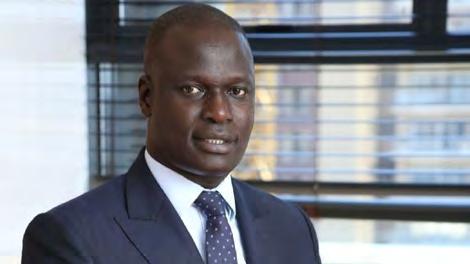
Below are the 12 teams from 12 African countries that will compete in the inaugural BAL season: Champions from the national leagues in Angola, Egypt, Morocco, Nigeria, Senegal, and Tunisia earned their participation in the inaugural season. The remaining six teams, which come from Algeria, Cameroon, Madagascar, Mali, Mozambique, and Rwanda, secured their participation through BAL qualifying tournaments conducted by FIBA Regional Office (Africa) in late 2019. The BAL groups and additional details about the league will be announced at a latter date.

• Amadou Gallo, BAL President
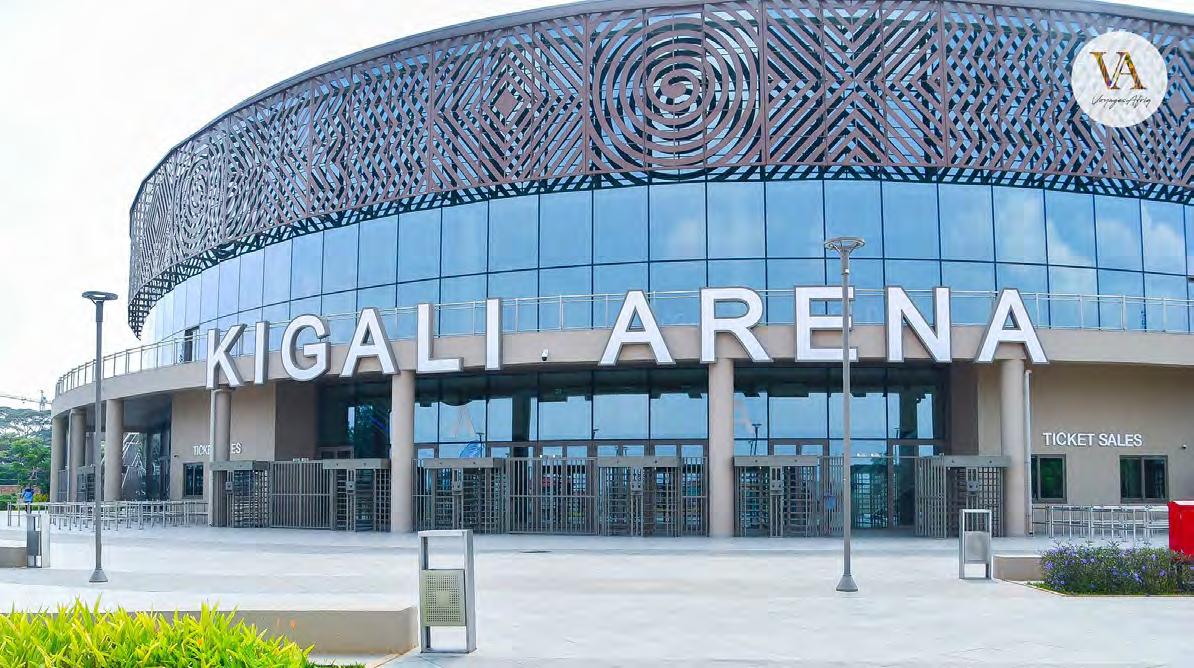
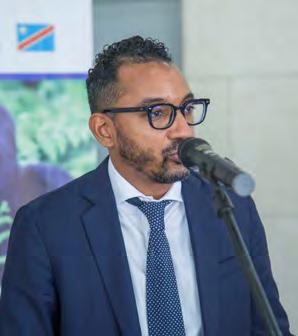
DRC Launches National Tourism Policy

The Democratic Republic of the Congo (DRC) has launched its National Tourism Policy. The policy document was unveiled by President Félix Antoine Tshisekedi who chaired the opening of the International Tourism Fair in the capital, Kinshasa. “Investment and the promotion of tourism in the DRC” is the theme chosen for the show.
The policy was a collaboration between the DRC’s Ministry of Tourism and the World Tourism Organization (UNWTO) where the latter offered its expertise to develop it to boost tourism development in the country. Speaking at the launch, the Minister of Tourism Dr. Yves Bunkulu said the Ministry has led efforts to ensure that the vision of the president in making tourism one of the pillars of development is realized. He added that the National Tourism Policy for the development of tourism in DRC has an ambitious goal of making the country one of the 10 best destinations in Africa by 2030. The Deputy Director of the Africa Department at UNWTO Jaime Mayaki said “I am convinced that the National Tourism Policy presented here today which is the result of a consulting process between public and private sector tourism stakeholders, will help the Government reach its objective of becoming a major tourism player by 2030 and rely on its tourism sector as a key tool of economic transformation and job creation for the youth.” “The most important part now is its implementation” he added.
The UNWTO International Expert in tourism planning and investment, Toufik Souli was also at the launch to present the content of the Tourism Policy to the provincial tourism Ministers and other key tourism stakeholders. “The presence of the Head of State the day before at the opening ceremony sends an important message.“It gives a clear signal of the role of the tourism sector in the inclusive and sustainable growth of your country,” he said. DRC also became the first African Member State to join the UNWTO Silk Road initiative.
• Jaime Mayaki, Deputy Director of the Africa Department at UNWTO
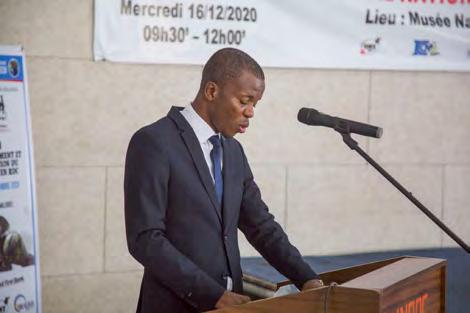
Gondwana’s 25 years of impeccable hospitality service to Namibia’s Tourism Industry
For 25 years Gondwana Collection Namibia has been at the fore of hospitality and tourism excellence, providing bespoke and unforgettable experiences to clients and guests. But at the core of this, is a brand that puts people first and remains a stickler for enduring values and culture. A true testament of this is shown in the company’s continuous retention of its staff strength in the midst of the ongoing Coronavirus pandemic layoffs have become rife.
“One thing we are extremely proud of is that during this pandemic we have not retrenched a single person. We have almost 1,100 Namibians in our employees and we are very much rural-based. We are based in the villages out there and we understand our impact and responsibility, so we are really proud that we could have our people and culture intact and obviously our company intact throughout this pandemic,” said Managing Director, Gys Joubert who took his turn on the VA Tourism Podcast with Kojo Bentum-Williams, Editor-inchief VoyagesAfriq Magazine.
He revealed that the pandemic has presented the biggest challenge to their operations which necessitated austerity measures such as salary cuts with members of the Executive Management taking the biggest cut. Added to that, Joubert said, “We feel our role and responsibility in this nation is more than just a company in terms of business and profit-driven. We have a responsibility as a responsible corporate citizen to our fellow Namibians and to have an impact whenever we can. And I think our key trust speaks a lot to that, we have so many projects in terms of providing meals to the least fortunate people and many other projects.” He said that the hospitality brand could not be prouder of their Namibian roots and identity. “We are very proud of who we are, as a proud Namibian company; Namibian born and Namibian raised. So that to us is very important; our positioning and responsibility as a Namibian corporate citizen. Yes, 25 years with humble beginnings in the far south and we’ve grown organically over the years and especially the brand and what the brand stands for, and I think that is always important, and the values and the culture,” the MD emphasized.
The Gondwana Collection Namibia combines its hospitality business with nature conservation and social commitment in a sustainable manner all over the Sothern African country. Beyond that, however, Joubert said they have plans and dreams to expand.
“We have a whole lot of ambitions both in terms of further expansion in Namibia. We have plans also in terms of digital expansion and digital offerings that we want to bring to the world. Again we have regional expansion further in the value chain to make sure that we can be a complete one-stop shop in tourism services that people can feel a part of.
“We own a property in Victoria Falls in Zimbabwe and we had plans to start developing that last year. But because of the pandemic we had to put everything on ice. The rest is more of exploration but since digital has made the world a small place we will bring quite a few things to the market in the next six months on that track,” he disclosed.
Properties within the Collection have all been given Covid safety certifications and this Joubert explains is a testament to the seriousness with which they are committed to ensuring the safety of guests “We just received certification of one of our hotels where we scored 100%. So we are very proficient in terms of our Covid protocols. We also bring to hospitality the Gondwana warmness and kindness so we are definitely providing a safe environment for our guests.”
Namibia, he said, has wide open spaces with natural social distancing “so, in terms of what the future is for tourists, especially in the short and medium term what they look for; solitude and safety. I think Gondwana is perfectly positioned to provide a breakaway. Come and see the African experience in Namibia; people and our wildlife. But you can do that in the comfort of your own vehicle, self-drive on safe roads with vast distances and it’s not a crowded destination.”
In addition to this, Joubert expects the Gondwana brand to bring true and holistic humanity to the corporate world in Namibia and beyond it.

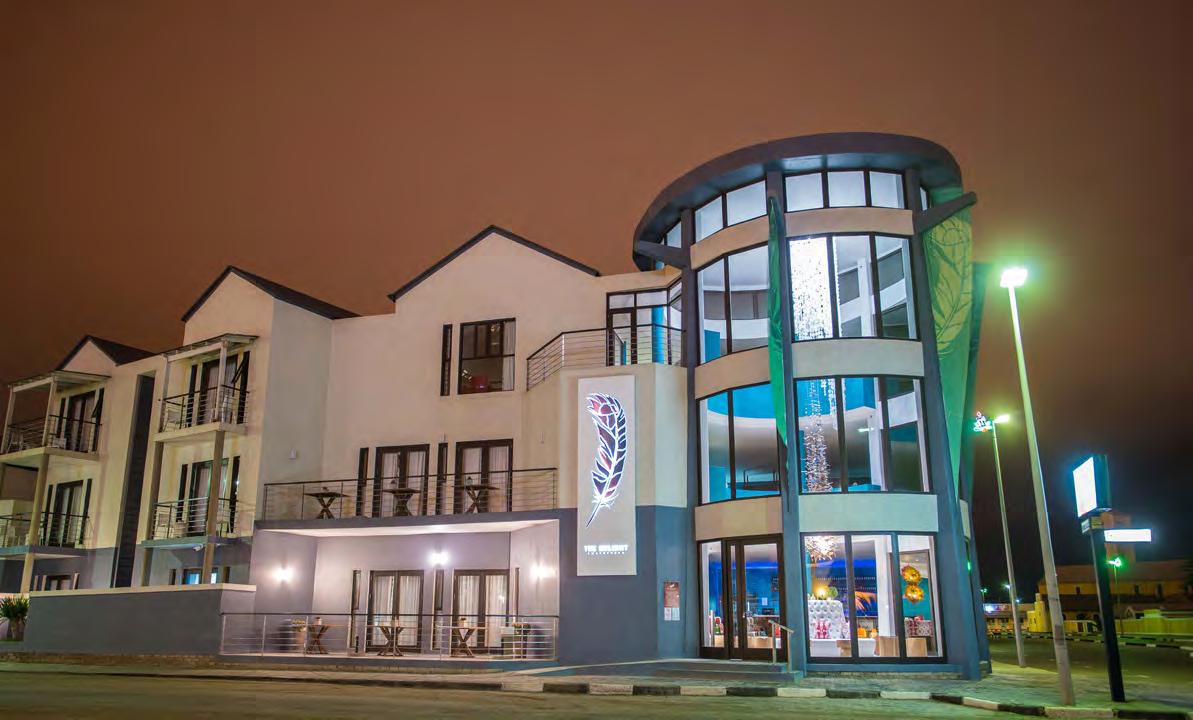
• Gys Joubert, Managing Director
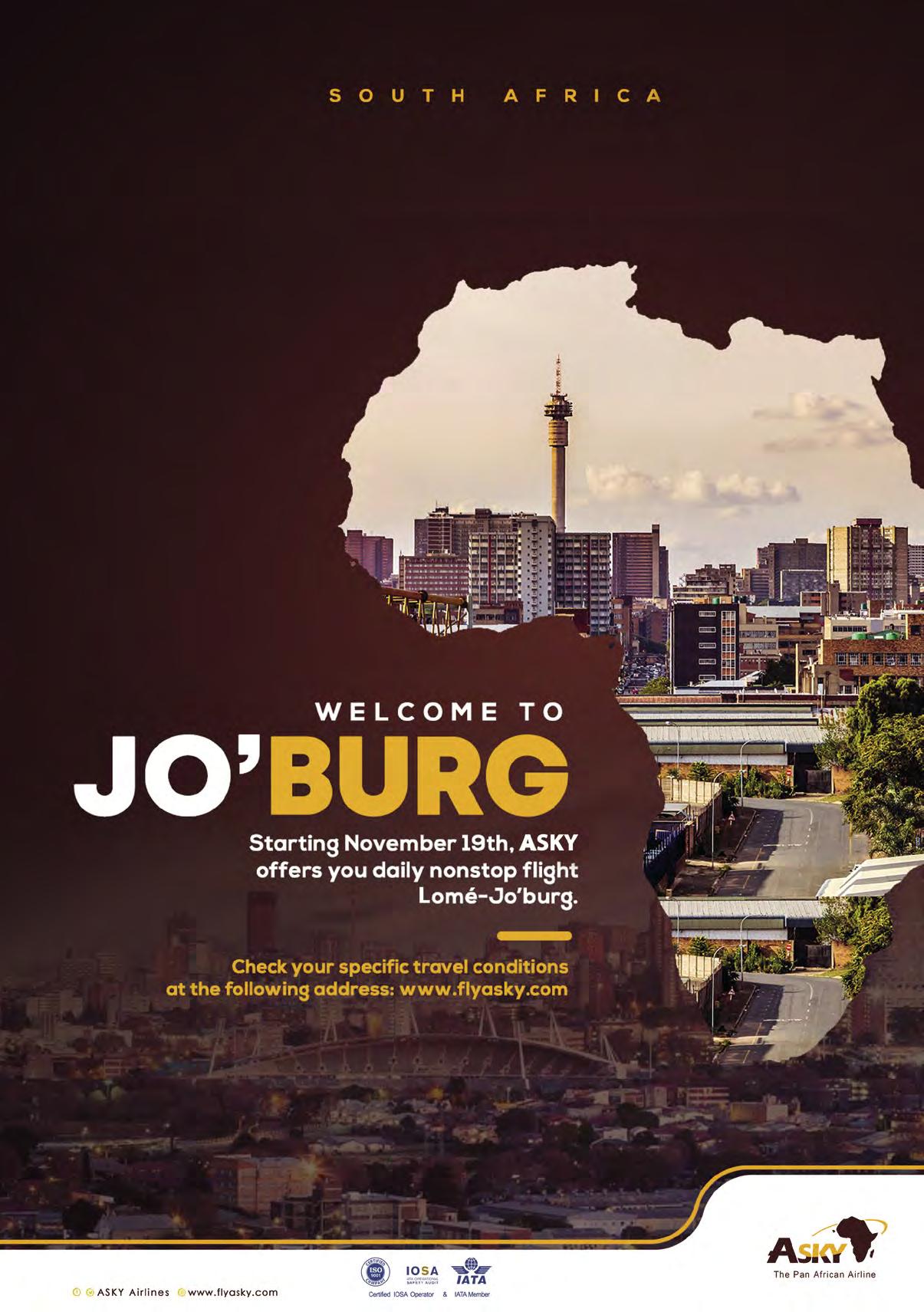
Siandou Fofana retained as Tourism Minister to lead Sublime Cote d’Ivoire agenda

President Alassane Ouattara has reappointed Siandou Fofana as Cote d’lvoire’s Minister of Tourism. His retention is seen as an expression of confidence by the President in the Minister who has already set the West African country’s tourism on a transformation course.
Some of the key undertakings of Fofana during his first term as Minister include, the launch of the flagship ‘Sublime Cote d’lvoire’ project, which seeks to overhaul the country’s tourism landscape through ambitious projects and initiatives.
Fofana also led Cote d’lvoire to be admitted to UNWTO’s Executive Council as a member. Under his tenure, the country hosted the first-ever Global Tourism Investment Forum in Africa organised by the UNWTO. In order to drive investments into Cote d’lvoire’s tourism, Fofana led a series of fund raising activities in Dubai in 2019. He’s also helped to establish closer ties with UNWTO and Cote d’lvoire will be the global host of this year’s World Tourism Day on September 27th. Fofana says he would work to get Cote d’lvoire’s tourism going in these pandemic times when tourists are not expected to throng into the country en masse. “Tourism as a whole will undoubtedly undergo an evolution, even a mutation. We are working with our teams to anticipate the tourism of tomorrow, which will take into account two major criteria. Firstly, the potential disappearance of mass tourism as practiced before the crisis, followed by the development of a more socially and medically responsible form of tourism. “Our community of destinations requires that our sense of collective responsibility begins with individual responsibility. Our current vision of tourism must be more in line improving the sanitary and hygienic standards without altering the attractiveness of the Ivorian destination in the eyes of investors. This is the challenge of post-Covid tourism in our country.”
Our community of destinations requires that our sense of collective responsibility begins with individual responsibility. Our current vision of tourism must be more in line improving the sanitary and hygienic standards without altering the attractiveness of the Ivorian destination in the eyes of investors. This is the challenge of post-Covid tourism in our country.
African Group at UNESCO courts support for African World Heritage Fund
• Ambassador Albertus Aochamub, Chair of the Africa Group at UNESCO

The African Group at UNESCO is working to secure more funding for the African World Heritage Fund which is dedicated to listing more heritage sites on the continent for protection and conservation.
Albertus Aochamub, Chair of the Africa Group at UNESCO made this known during an interview with VoyagesAfriq in Namibia.
Annually, the African member states of UNESCO elect, from their peers, a chair and Namibia was bestowed the honour for 2021. The Group is divided into sub-groups such as the Southern, Central and West Africa with their own chairpersons. Together with those chairs, they constitute the Bureau of the Africa Group under Namibian leadership. The Group principally work to try and reach consensus on key issues that concern Africa within UNESCO’s fields of competence. These could be about the return of stolen artefacts to Africa, mitigating the impact of Covid 19 on Education, AI, Ethics and so forth.
Overall, they ensure that one of the two (2) key tenets of UNESCO, namely, Priority Africa and Gender Equity are fully funded and implemented across all programmes of UNESCO.
According to Ambassador Aochamub, “We have two key strategies which are to build the technical capacity of member states to inscribe more sites on the global register and adequately fund initiatives aimed at protection and conservation of sites in danger of delisting.” “Our main job, in that context as the African Group at UNESCO, is to lobby partners across the world to support the work of the African World Heritage Fund (AWHF).” he added.
The AWHF was established in 2006 as a Trust under South African law as the host country on behalf of the continent and was granted UNESCO category II status in 2009. The institution is tasked to reverse a situation where African sites on the global list only represent a mere 12.22% of total inscriptions. Of the total African sites that are inscribed on the Global list, 16% are in danger. “It is, therefore, our collective vehicle to drive all technical efforts aimed at inscription of more African sites on the global register. So, we have work to do as a continent in increasing the number of sites on the global list and address the issues facing the sites in danger. We at the Africa Group at UNESCO are committed to playing our part in lobbying and raising awareness,” Ambassador Aochamub posited.
2021 and the 4th Africa Business and MICE Masterclass birth Action Group for Africa Meetings
• Group photo of participants at the Masterclass
Nearly half a dozen of Africa’s leading convention bureaus has committed to pushing for an action group whose aims are targeted at building a resilient and vibrant business event sector.
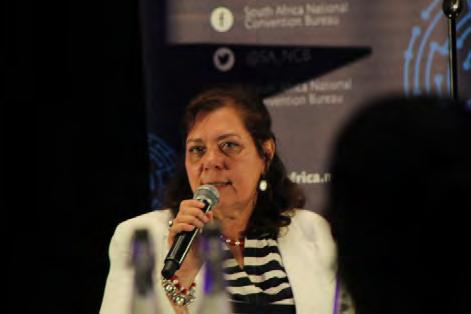
The idea which was first conceived at the inaugural Africa Business Tourism and MIC Masterclass in 2018 gathered momentum during the 4th edition and 2021 two-day Africa Business and MICE hybrid Masterclass hosted by South African Tourism and Gauteng Convention and Events Bureau on 24 and 25 March 2021.
Senior Government officials from South Africa, Ghana, Rwanda, Seychelles and Tanzania made a strong case for the collaborative group which they believe will help coordinate, lobby and collectively pitch for events for the Africa region. The Action Group is expected to identify and prioritize agenda points to guide the coalition’s activities and operations. Among other things the group will undertake is to conduct high-level research on existing coalitions and groupings to identify the preferred format, constitution, roles and responsibilities for the Action Group. The CEO of Africa Tourism Partners ,Kwakye Donkor who initiated the process believes this is the right time to consolidate the gains the sector has chalked in the region. ‘’If there is anything we can take away from the pandemic, it is collaboration, partnership and mobilizing together to rotate events in the region and also attract mega and legacy events to the region. We can no longer work in silos and the MICE sector can be the bedrock to accelerated tourism recovery if well-coordinated.’’ Sharing in-depth analysis and data following the dreadful effects of coronavirus on the sector at the Masterclass, speakers affirmed the need to make hybrid an intrinsic part of various MICE models across Africa. Designed as the first hybrid Africa MICE Masterclass since
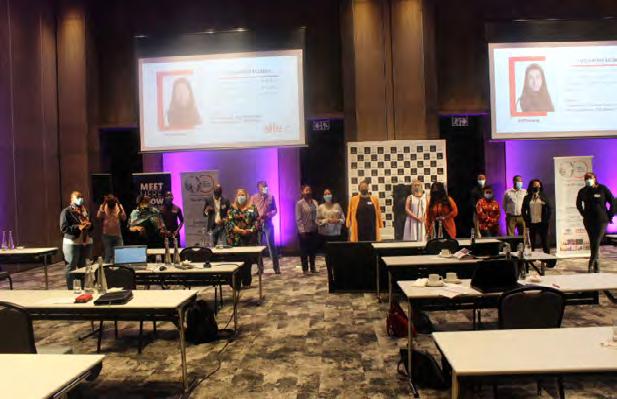
its inception in 2018, this year’s Masterclass assembled a limited number of pre-selected 50 in-person attendees and 250 virtual delegates from over 20 countries in Africa and the rest of the world. It was organized by the Africa Tourism Partners in partnership with BDO and hosted by South Africa National Convention Bureau and Gauteng Convention and Events Bureau.
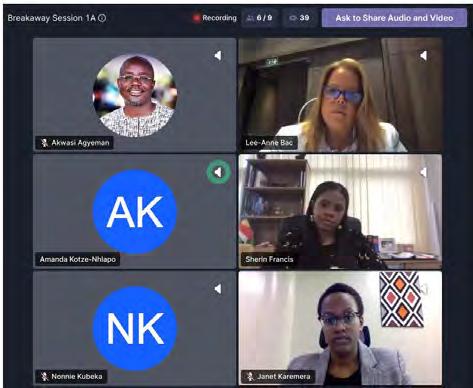
• Amanda Kotze speaking at the Masterclass
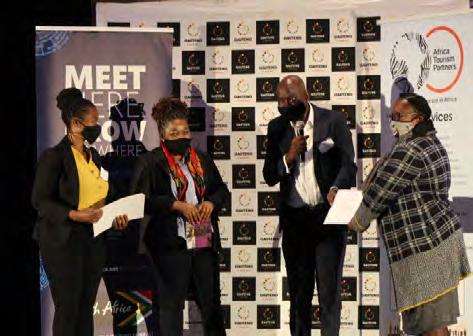
Rwanda Gears up for Commonwealth Heads of Government Annual Meeting
Rwanda is preparing feverishly to host the 44th Commonwealth Heads of Government Meeting (CHOGM).
With the Covid-19 vaccination program going well according to plan, the hospitality and tourism sector is well prepared to showcase what will become the first major in person high level meeting. Advance team of delegations have been visiting Kigali to familiarize themselves with the preparations in the midst of the coronavirus pandemic.
With hotels and accommodation establishments ensuring that safety and health protocols are enforced to the letter, the Rwanda Convention Bureau has been guiding and supporting stakeholders. Leaders from all 53 Commonwealth countries are expected to attend.
President Paul Kagame and Secretary-General Patricia Scotland earlier last year announced that CHOGM 2020 will be held at the Kigali Convention Centre during the week starting 22 June. The theme for the meeting is ‘Delivering A Common Future: Connecting, Innovating, Transforming’. Five sub-themes have been identified for discussion: Governance and Rule of Law, ICT and Innovation, Youth, Environment, and Trade.
Building on progress since CHOGM 2018 in London, leaders are expected to discuss ways the contemporary Commonwealth can transform societies, in accordance with Commonwealth Charter values of democracy, multilateralism, sustainable development, and empowerment of women and youth.
President Kagame said: “It will be a great pleasure to welcome leaders of the Commonwealth when they gather in Kigali. We will work hard to make everybody feel Rwanda is an extension of their home.
“The distinctive aspect of CHOGM 2020 will be connectivity including what young people can do with technology to create vibrant societies and develop our economies.”
Secretary-General Scotland stated: “I think the youth demographic we have now is a real opportunity. It’s going to be a very exciting chance for us to enable our young people to develop and deploy the skills they need so they can fulfil their potential.
“By connecting, innovating and transforming, the Commonwealth opens up scope for mobilising the talent of people of all ages and backgrounds.” Apart from the meeting of Heads of Government, the week will include a meeting of foreign ministers and fora to engage young people, civil society, women and the business community.
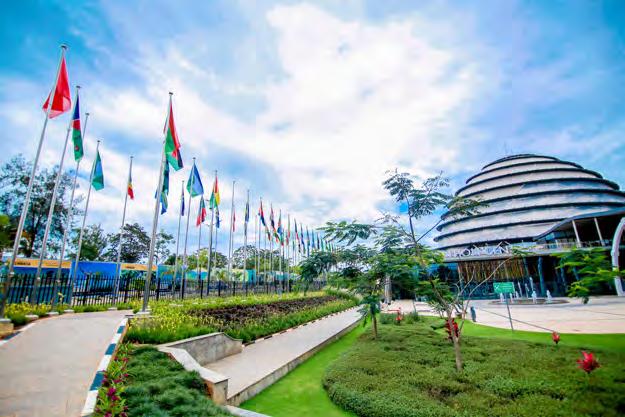
The Tanzania Tourist Board has announced October 8-10 2021 as the date for the 6th Swahili International Tourism Expo (SITE). In a brief media advisory, the TTB said, this year’s edition of SITE will be held at Mlinani city, Dar es Salaam from 8-10 October 2021.
The last edition of SITE (2019) hosted over 200 exhibitors and 300 plus hosted buyers from more than fifty-seven countries.
S!TE aims to bring together exhibitors from Africa as well as buyers from all over the world to showcase Africa’s tourism offerings. The expo connects tourism operators in Tanzania and neighboring countries with major tourist markets through the hosted buyer programme.
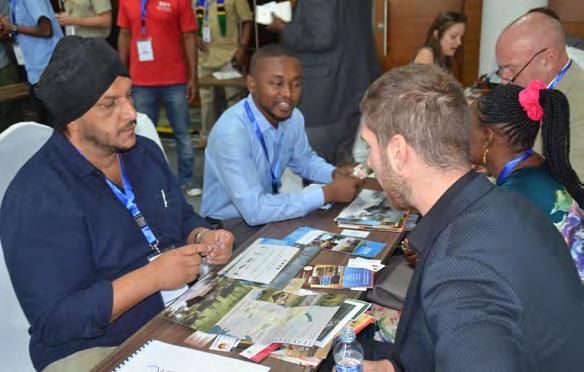
The Foundational Pillars of AfCFTA
By Michael Sudarkasa
• Michael Sudarkasa
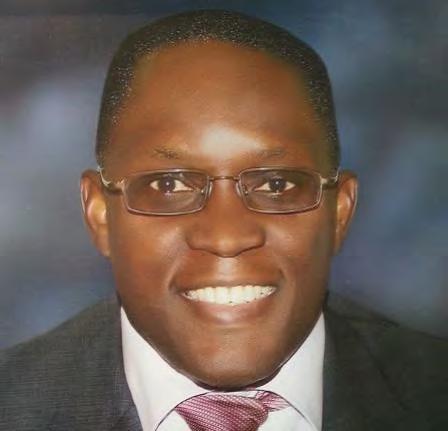
The continent of Africa has a land area of 11.7 million square miles (30.37 million square kilometres), which is large enough to fit India, China, the US, Mexico, Japan, and many European nations, combined. With 55 countries and a population of 1.2 billion people (which is expected to double over the next 3 decades to 2.4 billion in 2050), Africa is an exceptionally large geographic territory. In January 2021, the African Union launched the African Continental Free Trade Area (AfCFTA) an ambitious initiative to promote the development of made in African goods and services and to facilitate duty free trade amongst the nations of Africa. Meant to integrate the five contiguous regions of Africa – Central, Eastern, Northern, Southern and Western Africa – and create one single trade bloc, one of the first aspects of AfCFTA that any business interested in taking advantage of the agreement must come to terms with is the enormity, complexity (national languages include Arabic, English, French, Portuguese, Spanish and a number of widely spoken indigenous African languages also influence the language of commerce), and ethnic and ecological diversity of the continent. Despite the single market aspiration, homogenous is something that Africa is not!
While digital exploration of the continent is possible today in ways never before possible with the rapid expansion of internet access and mobile telephony on the continent, there remains a dearth of information, particularly economic and business information about many countries, industries and markets across Africa. Furthermore, given the unfamiliarity with the concept of doing business virtually with persons one has never met as a business cultural norm in Africa, and add in the unreliability of many of the electricity networks on the continent, and one finds that online communication is not always seen as an adequate substitute for face-to-face meetings, particularly at the beginning of a business relationship. Furthermore, it is also important to recognize that the colonial ties that bind Africa to Europe, and the global natural resource linkages that have created strong economic linkages between the US and certain countries in Africa and China with certain countries in Africa have facilitated greater familiarity of African based enterprises with the mores of doing business in Europe, the US and China, than familiarity with how one pursues business across the continent, particularly intra-regionally. Thus, to envision increased intra-African trade, one must envision increased intra-African travel. As a prerequisite of greater regional trade, there will be a rise in increased participation in conferences and exhibitions and more general trade and investment learning journeys in the coming months and years to facilitate greater understanding of Africa’s diverse markets by African based enterprises seeking partnerships and opportunities across the continent.
Travel and business tourism will thus both be the catalysts of greater intra-African trade. Those African nations that seek to improve the experience of business travellers (with efficient, comfortable, and secure airports, easy to access transport, and clean, convenient, and affordable accommodation) will significantly advance their trade opportunities their attractiveness as a business locale where it is easier to do business will be increased. Thus, the 1000-mile journey toward AfCFTA begins with the first step of building back Africa’s travel and tourism structures to make it easier for continental businesses to explore firsthand the continent’s growing business opportunities.
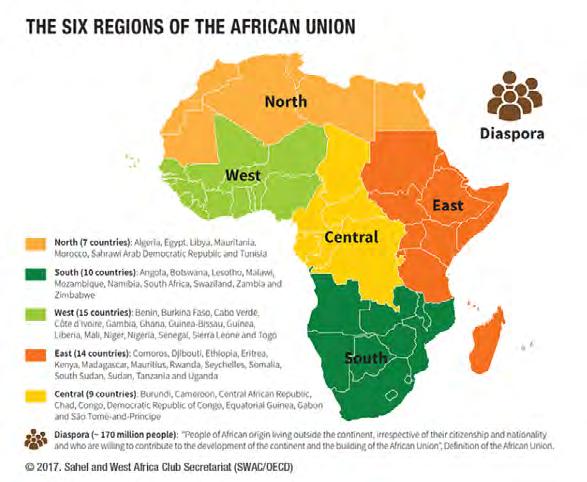
CELEBRATING SUSTAINABILITY CHAMPIONS
Judy Kepher-Gona gives us an insight into her life as she talks to Mafalda Borea about growing up in the Rift Valley, and how she found purpose to become one of Africa’s top ecotourism experts.
1. Where did you grow up? I grew up in Nakuru, Kenya’s Rift Valley. It’s the country’s fourth largest city after Nairobi, Mombasa and Kisumu. 2. How did a sense of environmental sustainability come into your life?
We lived close to Lake Nakuru National Park. The edge of the Park was surrounded by many kale farms walking distance from where we lived. Every so often, we heard of hippo invasions and the crop damage they made. We would also hear of buffalo and other animals scaring the farmers.
I learnt later on, in the early days of my career, that this was “crop predation”, a form of human wildlife conflict. Despite growing up next to the Park, I never had a chance to visit it until I graduated from college and joined the Kenya Wildlife Service. Back then we all knew that the park was for “Mzungus” - white foreigners. A sense of sustainability, in general, came into my life when I joined Kenya Wildlife. It was there that I was exposed to the first real complaints from communities regarding the human/wildlife conflict. I also became more aware of issues of access, benefits and rights of communities living adjacent to National Parks. While at Kenya Wildlife Service, I had a chance to be part of a team that organized the first ecotourism conference in Africa. This conference was hosted by Kenya Wildlife Service in Nairobi, Kenya, in 1998, in collaboration with The International Ecotourism Society (TIES) and Ecotourism Kenya. I was part of the team that put together the program, invited speakers and managed the actual conference.
The discussions, the insights and meeting visionary ecotourism champions changed my perspective of tourism, conservation and the plight of host communities in tourism forever. I found purpose. I made a resolution to champion ecotourism. Soon after this conference, I joined Ecotourism Kenya as CEO and like they say, the rest is history. Over the years, my perspectives of environmental sustainability have been shaped by new and emerging knowledge on this ever evolving theme. 3. Which long standing sustainability practice or habit has significantly improved your life? Sustainable consumption. I am very aware of wasteful consumption in all forms. Whether it’s about creating unnecessary waste from packaging and wrapping material, or choosing between baths/showers and time taken. I don’t pick printed promotional material distributed in tourism events, I would rather buy a book instead. 4. Is there a new one you are cultivating now? Yes. Carbon miles. Considering carbon footprint of things that I consume. From food in restaurants to gifts I share. 5. Which environment or nature oriented podcast would you recommend and why?

• Judy Kepher-Gona
The only podcast I follow, the Voyages Afriq Tourism Podcast.
6. Which book(s) would you recommend to people who want to be more environmentally conscious and "become the change they want to see in the world" (Ghandi)?
There are many great books on environmental consciousness, one needs to constantly update our libraries. For me it is not just about one book, it is more about the practices in general. There is a great book on Environmental impacts of ecotourism by Ralf Buckley that has everything you need to understand footprints of different travel adventures.
7. Whose environmental or conservation work do you most admire?
The late Nobel Laurette Professor Wangari Mathai. She said “you don’t need a diploma to plant a tree”, she also said, “Money is good, very. But if we look for it through killing our trees and poisoning our rivers, only then will we realize that we cannot eat money!”. She looked at environmental management as key to addressing poverty. I believe this is true for Kenya and many other destinies around the globe. 8. Which internet resource would you recommend that you find consistently helpful and beneficial? SKIFT.com for news, research, and marketing services for the travel industry. 9. Is there anything you try to keep in mind each day with regard to environmental sustainability? That there are 7 billion of us in one planet. That natural resources are finite and there is no planet B, so we must consume and produce responsibly. 10. Which environmental change would you most like the next generation to experience? Reversed global warming. 11. What is the best advice you ever had on sustainability or the environment, and who gave it to you? Standing up for environment and sustainability is not a job. It is a calling and happens when you find purpose. Choosing sustainability and environment is to go against the wind. It can be lonely and tough, you need commitment and passion. These are all great lessons from the life and times of late Prof Wangari Mathai. 12. What is the best way to captivate the next generation on the topic of sustainability? Engage them in current affairs by creating safe spaces for them to have a voice, engage and act. 13. Which current sustainability stories give you the most hope? Stories of community assets, both cultural and natural, that are available for tourism. Knowing that they are being valued and that those same communities are entering the tourism supply chain not just as beneficiaries but also as suppliers. 14. Which aspect of nature, or which animal, gives you the greatest sense of awe? Giraffes in bushes in the savannah. They are graceful. In my world, they communicate tranquillity and beauty of nature. 15. What was the most impactful, transformative or enriching travel experience of your life so far, and why?
In Madagascar, Tsara Komba, an investor, helped a community that had lived as squatters on the land he was offered for investment. He helped them to get rights and title to that same land and helped them rebuild dignified lives on the island giving them access to paths, graveyards and banana plantations. I have had many travel experiences, been an assessor for sustainability in top end destinations and lodges in Eastern & Southern Africa, but nothing beats the experience of seeing people whose dignity was restored by a tourism project. 16. Where will you be going next on your travels? Masai Mara. Because there are happy people projects that I care for in Mara and I have not been there since the beginning of the pandemic 17. What are your favourite two 'Sustainable
Development Goals' and why? SDG 1: To end poverty in all its forms, everywhere. When people are economically empowered we can achieve respect for the environment and other human rights, we can have equal and meaningful partnerships and reduce dependency on land. SDG 12: To ensure sustainable consumption and production patterns. Because it is the foundation of all the environment SDGs.
Judy Kepher-Gona, is the founder of Sustainable Travel and Tourism Agenda(STTA), a Pan African organisation shaping a sustainable future for Africa’s tourism.

Mafalda Borea is Voyages Afriq’s Sustainability Editor and the CEO of Sustainable First.
AIR NAMIBIA
Ceases Operations
Namibia’ s flag carrier, Air Namibia rounded up its operations as at 11 February, 2021 following cabinet decision to file for voluntary liquidation. Air Namibia in a short media advisory confirmed the latest development and has directed all affected passengers to contact agents for a refund.
“Air Namibia wishes to update the flying public, trade and all stakeholders on the status of the national airline operations; 1, effective Thursday 11 February 2021, all flight operations will be cancelled, with all aircraft returning to base. 2. The reservation system for taking new bookings is also suspended,” the advisory read. Over 600 staff are expected to lose their jobs in this move. In a statement released to the media, the Minister of Finance Ipumbu Shiimi said ‘’This difficult decision was taken after a careful consideration of the various options to save the national airline. All options assessed point to the fact that the national airline is not profitable and it has not been profitable since its inception. The net economic costs of Air Namibia’s operations far outstrip the net gains and it is thus unsustainable. It is estimated that so far government has spent more than N$8 billion on Air Namibia. At this stage, the country’s economy, can no longer afford to perpetually provide financial support to Air Namibia at the expense of supporting economic growth and critical social services.’’

RwandAir is the first African airline to vaccinate all staff against Covid-19, a situation which will position the carrier as one of the safest on the continent.
The airline began its vaccination rollout programme earlier in April targeting all staff and crew who received their first shot.
Non-airline staff at Kigali International Airport, the airline’s hub, have been vaccinated as well to ensure a safe and secure environment for all passengers. The drive comes just after RwandAir announced it will be the first carrier in Africa to start trialling the IATA Travel Pass in April 2021 to enable the safe resumption of international travel.
Yvonne Manzi Makolo, CEO of RwandAir, said: “Rwanda’s rapid roll-out of the first consignment of vaccines to arrive in the country prioritized all frontline workers, including RwandAir’s staff and crew. The vaccination programme has been designed to ensure we provide a safe and secure environment for travellers, both in the air and on the ground.” “We have carefully considered every customer touchpoint at Kigali International Airport and on board our aircraft, as the world resumes travelling in the post-Covid era.” “We look forward to welcoming our customers back to RwandAir. As an airline, the health and safety of our customers and staff is our number one priority and we have been working hard to restore our customers’ confidence to fly.” In addition to RwandAir staff and crew, the staff of other airlines operating at the Kigali International Airport also received their Covid-19 vaccinations at the same time.
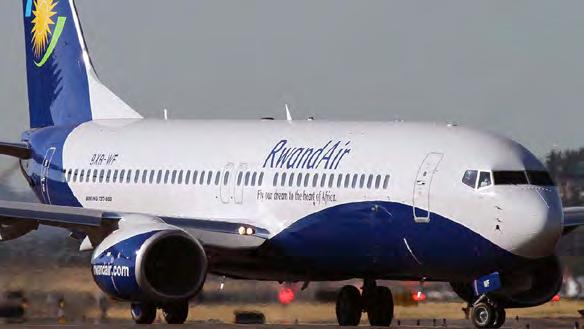
Ethiopian Airlines Joins African Union to Launch Test and Vaccine Passport
Ethiopian Airlines has partnered with the African Centers for Disease Control and Prevention (Africa CDC) for the implementation of the African Union Trusted Travel Pass to make continental travel easier and safer amidst the COVID -19 pandemic.
Africa CDC has mobilised a broad multi-stakeholder publicprivate partnership with the help of its strategic partners, the PanaBIOS Consortium and Econet. The partnership has the objective of addressing current challenges posed by citizens’ and institutions’ difficulty in accessing accurate health information, high costs and inconvenience in cross border travel and poor data for health policy and biosecurity planning. The Trusted Travel Pass program will ensure country regulations regarding COVID-19 travel requirements are met with minimal room for error and hassle to the travelling public. Ethiopian Airlines’ customers will now enjoy hassle-free travel experience with their travel pass helping them verify whether their medical information meets various COVID 19 regulations of their destination. Ethiopian Airlines has been the pioneer in introducing new technologies to make travel contactless and convenient in an effort to curb the spread of the pandemic and restore passengers’ confidence in air travel. This latest partnership considerably deepens this longstanding tradition by boosting the safety of passengers and nations alike; and reaffirms Ethiopian’s strong commitment to being a major part of the African pandemic recovery effort. Commenting on the implementation of travel pass, Mr. Getinet Tadesse, Chief Information Officer at Ethiopian Airlines Said, “We are offering new digital opportunities to our passengers so as to fully and safely restore air travel. We are pleased to have introduced a digital platform that will be pivotal in increasing the number of passengers while making air travel safer. The solution is capable of addressing passengers’ travel needs during the COVID -19 pandemic as it helps them validate their test and vaccination documents before departure. As a safety first airline, we are striving to make travel safe and seamless especially with regard to the implementation of COVID 19 prevention strategies.” The trusted travel pass solution will help to validate test and vaccination certificates and verify that they are sufficient for their route and share testing or vaccination certificates with airlines and authorities to facilitate travel. The solution will also avoid fraudulent documentation and make air travel more convenient.
Dr. John Nkengasong, Director of the Africa CDC, in welcoming Ethiopian’s pioneering spirit, also underscored how such partnerships are critical in the present context: “The scale of the challenge presented by Covid-19 demands an unprecedented level of both innovation and cooperation, which is why Ethiopian’s laudable decision to come on board Trusted Travel marks a watershed in the continent’s ongoing fightback against this pandemic’s quest to suppress Africa’s development ambitions.”
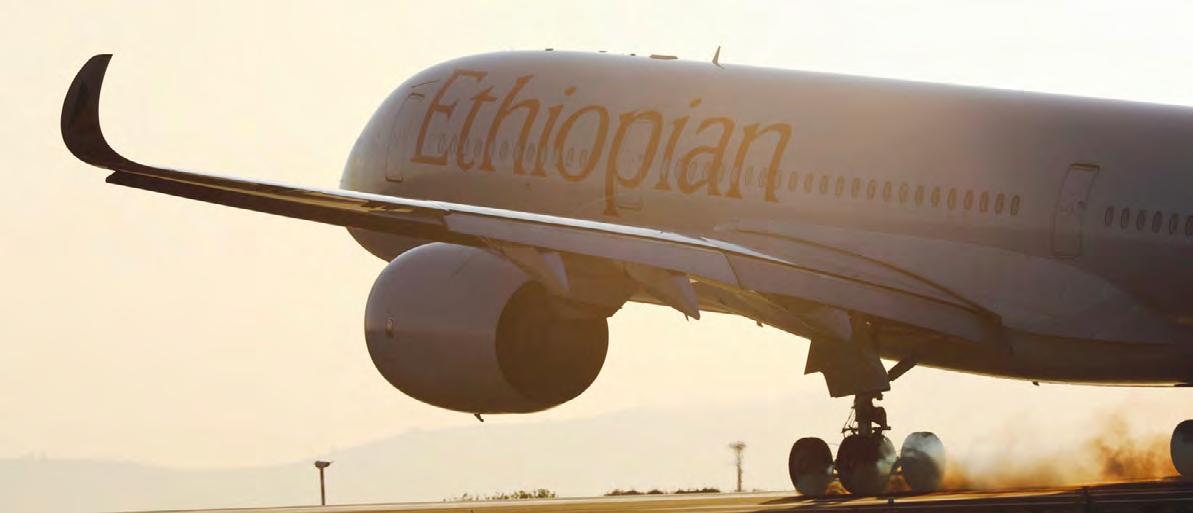
Russian Carrier Aeroflot makes a return to Seychelles after nearly two decades
An Aeroflot Boeing 777 has touched down at the Seychelles International Airport, marking the first scheduled direct service between Moscow and the Mahé Island.
The inaugural eight-hour 35 minutes flight was hailed as the ‘great come-back’ as Aeroflot is returning to the islands after 17 years. The flight was greeted on arrival by the Seychelles’ Minister of Foreign Affairs and Tourism, Sylvestre Radegonde, Minister of Civil Aviation, Ports and Marine, Anthony Derjacques and other officials from the tourism and aviation fields.
A total of 402 passengers disembarked to a typical Creole ambience as local musicians and dancers provided lively entertainment, after the plane had gone through the symbolic water canon salute. The landmark flight opens the way to twice-weekly flights between the two countries, and Russian travellers will now be able to fly non-stop to the island destination. Following the official cutting of ribbons, Minister Radegonde expressed his delight at Aeroflot for coming back and reestablishing air links between the two countries. He saluted the airline for this great show of confidence in the destination during a time that had seen innumerable route cuts in the industry. “The resumption of direct flights from Moscow to Victoria testifies to the confidence of the Russian national carrier in our tourism industry. Seychelles is a much soughtafter destination in Russia and in the Commonwealth of Independent States (CIS). The Russian market has always been a profitable one for Seychelles, featuring in the top seven destinations every year. It is a high-yield market, with an average stay of 9 to 13 nights. But visitor arrivals have been impeded by the lack of direct flights from Moscow," he said. Minister Radegonde described the touching down of the aircraft as a beautiful and joyous moment for the country, adding the return of the flight will help in the recovery of the Seychelles tourism industry. Minister Radegonde noted that the Russian market was a profitable one and said the direct flight will help to accelerate and grow it further. "With the introduction of twice-weekly flights by Aeroflot, I am hopeful that we can not only reclaim, but increase, our share of the Russian and the CIS market. It is within our ability to do so. We can do it if we all work together as a team – government and the private sector together." Aeroflot now joins four other airlines, which have resumed flights to Seychelles, whereas six others are expected back between April and October 2021. Aeroflot also expressed their joy to be back on the Seychelles’ route.
“We are very proud to be the very first European airline to come back to Seychelles in 2021 with a regular service between Moscow and Mahé, which is undoubtedly one of the most picturesque and authentic travel destinations across the globe,” said the airline’s Marketing Director, Anton Myagkov. “The new Seychelles’ service truly highlights Aeroflot’s extensive route network. As a global full-service airline, we perfectly match our premium onboard product and in-flight service with the exclusive touristic product of the Seychelles islands.”
Mr Myagkov added that the current passengers’ demand for this service already exceeds all their expectations, causing a sellout of the first flight in just a few days. “This has enabled Aeroflot to increase the operating frequency to two flights per week starting from Sunday 9th April, 2021,” he said. Commenting on the new flight, the Chief Executive of the Seychelles Tourism Board, Sherin Francis, also said the news of the return of Aeroflot has been met with much enthusiasm by the Seychelles trade.
“We are pleased to welcome back this new service to our shores. Russia is one of our top originating markets and we expect this new route and direct link to expand our reach in the market of that region,” she said. She added that the increased seat capacity is significant and underlines the airline’s confidence in Seychelles’, which is a highly sought-after destination.
